Shine A Light campaign seeks to ‘stop people in their tracks’
By David Rullo | Sta Writer

Maybe you’ve seen the electronic billboards and their jarring messages displayed around the city and surrounding areas.

“You’re not like other Jews,” one states in black bold letters against a yellow background. Another reads, “I would’ve never guessed you’re Jewish. You’re so cool.” A third plays on familiar antisemitic tropes asking, “Did you see the diamond on her finger? It’s huge! But what do you expect? She has a Jewish fiancé.”
It takes an exercise in concentration — not recommended for driving — to read the second, smaller line in green below all three messages clarifying the billboard’s intention: “There’s nothing casual about antisemitism.”
Eventually, the meaning becomes clearer as a multislide campaign is revealed. Later displays on the billboards read: “If you don’t think the Holocaust happened, maybe Jews aren’t your issue. Maybe history class is,” and “Antisemitism is bad for everybody. It starts with the Jews … but it never ends there.”
Unless you’re stuck in rush hour traffic, though, the likelihood of reading through the entire cycle of messages is slim. The concern of some Pittsburghers who have seen only one of the messages is that they could reinforce antisemitic tropes and stereotypes.
The billboards are part of a new campaign,
which also includes public service announcements airing during some of television’s most popular programs including “Today” and “Saturday Night Live.”
The television messages are more straightforward: “Hate doesn’t exist in a vacuum,” a voiceover says. “One form of hate leads to another. And there is one form of hatred on the rise in the U.S. often passed off as legitimate discourse or is just ignored: antisemitism.”
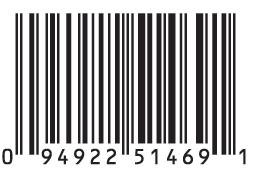
All of the messages include the logo of the campaign Shine A Light.








Shine A Light is a “convening platform,” according to Carly Maisel, from the Shine A Light Coalition.
“Basically,” she said, “it’s an opportunity for over 100 organizations to come together in a coordinated way and use the month of Chanukah, December, as a springboard to come together to advocate, engage and educate around antisemitism.”
Partnership against hate
Shine A Light was created last year by the Kirsh Foundation, eJewish Philanthropy reported. It works with its partners to proclaim allyship with Jewish people, as well as anyone who is targeted based on their identity.
The media campaign is just one part of the
Groundbreaking rabbi now calls Pittsburgh home
n the span of her career, Rabbi Rachel Adler has gone from a self-identifying Orthodox Jew to a Reform rabbi teaching at Hebrew Union College–Jewish Institute of Religion in Los Angeles. She’s swung from being a rabbi who once argued the value of family purity rituals to speaking against them. The author and teacher is now working to erase the gendered practices that are a part of Judaism while finding a home at a Conservative congregation in the heart of Jewish Pittsburgh.
Adler garnered national attention in 1971, while still identifying as an Orthodox Jew, when she published the article “The Jew Who Wasn’t There: Halacha and the Jewish Woman.” Fifty-one years later, the piece is acknowledged to be the first work of Jewish feminist theology/ethics.
Adler earned a Ph.D. in religion and social ethics from the University of Southern California with a conjoint certificate in Judaica from Hebrew College and a master’s in English literature from Northwestern University, and a master’s in social work from the University of Minnesota.
In 2012, Adler was ordained as a rabbi by the Hebrew Union College, a Reform
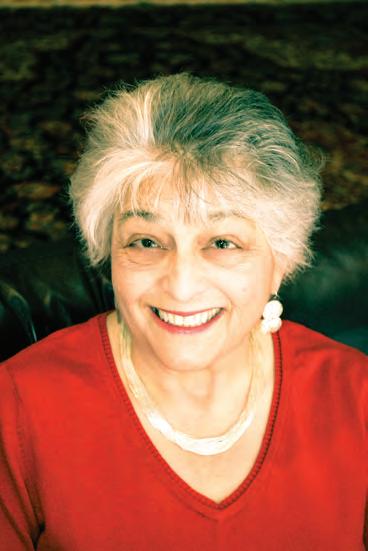
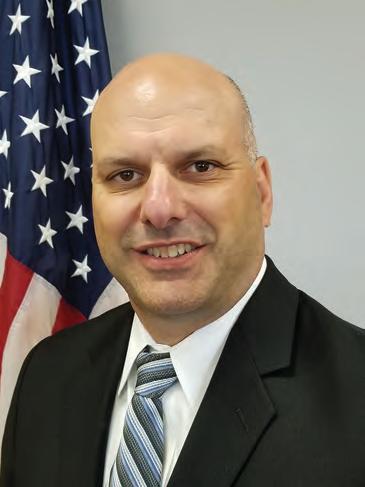
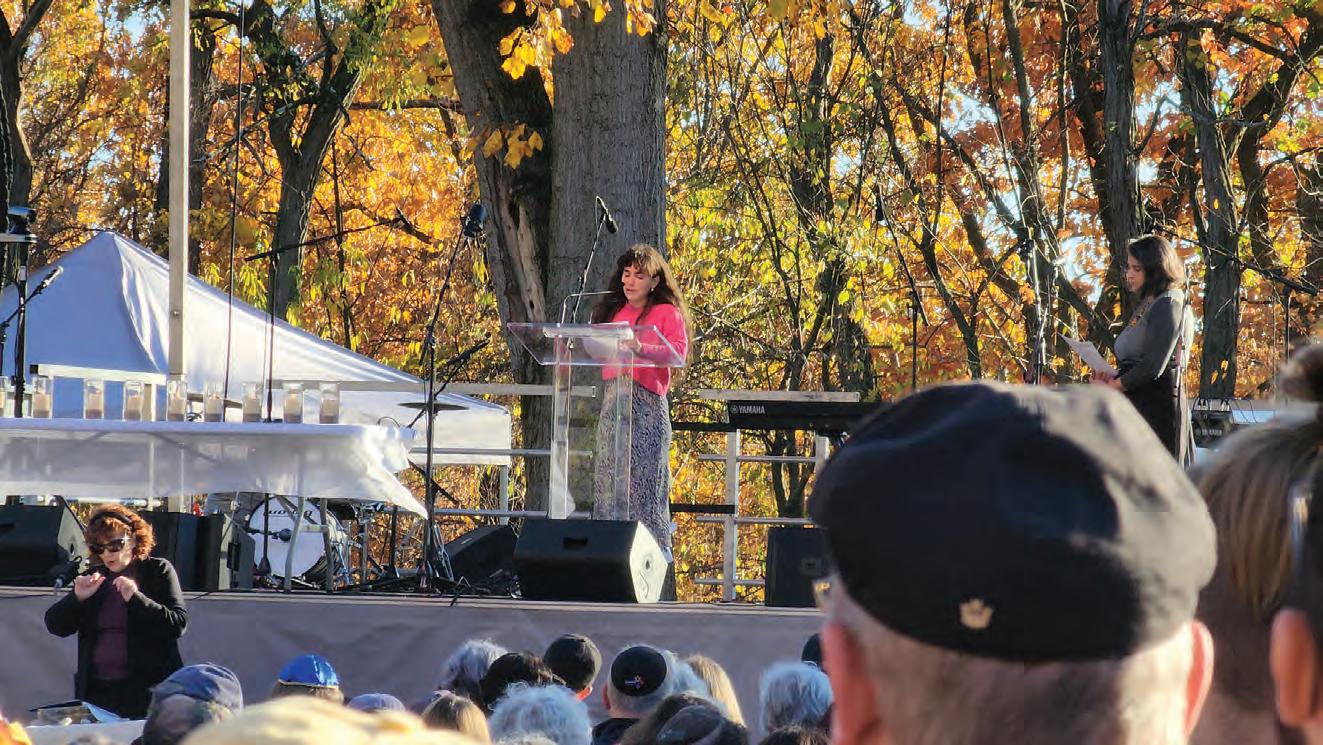
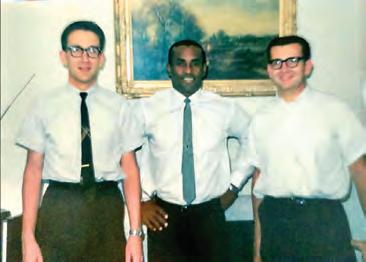
NOTEWORTHY LOCAL Lenda volorei ciendi non re nus Please see Billboard, page 15 Please see Adler, page 15 LOCAL A Hall of Fame friendship Jason Haberman takes the reins at the Mt. Lebanon Police Department Page 5 December 23, 2022 | 29 Kislev 5783 Candlelighting 4:40 p.m. | Havdalah 5:44 p.m. | Vol. 65, No. 51 | pittsburghjewishchronicle.org $1.50 Maglara / iStock Getty Images Plus
Photo courtesy of Rabbi Rachel Adler
A Shine A Light billboard on Banksville Road on Dec. 8 Photo by David Rullo
The Pittsburgh Jewish Chronicle: A vital community resource



dinner. His passion for reporting helped me gain insight and knowledge of our town, our state, our nation and our world.
Brian Schreiber

What does it mean to have a local Jewish newspaper in our community?
How would our community change if a local Jewish periodical didn’t exist?
As a child of a journalist, I have been reading newspapers almost as long as I have been reading. When I was an elementary school student, my father gave me a weekly assignment to select any article of my choosing from the Sunday paper and discuss it with him over
That habit stayed with me throughout my adolescence and through my adult life. We rely on trusted sources of news to learn, to analyze, to investigate, to question and to evaluate the everyday decisions we make in our professional and personal lives. My wife would tell you that among the first things I do before heading to the office is to peruse between four and six varied news sources (often online) to keep me current on the state of affairs in Pittsburgh, in the United States, in the broader world and in the Jewish world. I often email those who report directly to me at work with a PDF version of an article of interest before I even
drink my morning coffee.
Several times each week, both through print and online content, I have the opportunity to expand my world through the Pittsburgh Jewish Chronicle. It retains its independence while supporting the many Jewish institutions that represent the fabric of our community. It strikes the delicate balance of journalistic inquiry and community support. Its staff members live in our community and are stakeholders in our collective successes and challenges. They set aside their own biases in pursuit of the greater good, context and appropriate tone setting. Whether it is a feature story on a community member, an opinion piece or the weekly life cycle announcements, hardly a week goes by where I don’t learn something new.
YEARS OF GOOD NEWS
As president and CEO of Pittsburgh’s most broadly utilized Jewish organization, I rely on the Chronicle to cover our newsworthy activities and events. We benefit from an active and regular advertising presence to widen our reach and communicate to new audiences. We make that investment knowing that the Pittsburgh Jewish Chronicle remains a trusted source of news and information in our community.
I’ve lived in Pittsburgh for more than 30 years, and it is hard for me to imagine our Jewish community without this ongoing resource. PJC
Brian Schreiber is president and CEO of the Jewish Community Center of Greater Pittsburgh.

• Good news and bad news
• Happy news and sad news
• Local news about the Pittsburgh Jewish community
• National news

• Israel news

• World news
• People news — machers and everyone else
• Organization news — big and small
• Breaking news
• Trends and analysis
• News about the political left, the right and everything in-between
• News about the old, the young and everyone in-between
• Features – culture, food, history, travel, sports and more

• Opinions
• Letters to the editor
• Polls
• Life cycle events — births, b’nai mitzvah, graduations, engagements, weddings and anniversaries
• Obituaries
To make a donation, please scan this QR code or use the form below.
2 DECEMBER 23, 2022 PITTSBURGH JEWISH CHRONICLE PITTSBURGHJEWISHCHRONICLE.ORG ☐ Publisher’s Circle $3600 ☐ Guardian $1800 ☐ Macher $720 ☐ Mensch $360 ☐ Patron $180 ☐ Sponsor $120 ☐ Friend $60 ☐ Other Supporter $ Enclosed is my check to the Pittsburgh Jewish Chronicle for $ 5915 Beacon St. | Pittsburgh, PA 15217 | 412.687.1000 | pittsburghjewishchronicle.org 2022 ANNUAL APPEAL – CONTRIBUTION FORM Card # Expiration Date (mm/yy) Security Code LIST MY NAME (OR COMPANY) as: ADDRESS CITY, STATE, ZIP EMAIL HOME PHONE CELL ☐ I/WE WISH TO REMAIN ANONYMOUS Contributions are tax deductible. Charge my credit card the amount indicated below: Payment in full $ Recurring Monthly charge $ Visa MC Discover Name as it appears on the card Kindly fill out the donation card included with this issue of the Chronicle, or this form, and return it with your check or credit card information in the envelope included with this issue of the Chronicle. We thank you, and the Pittsburgh Jewish community thanks you! Appeal
60
Although our roots go back to 1895, this year marks the 60th anniversary of the Pittsburgh Jewish Chronicle! What kinds of news have we been publishing since 1962? • Quality news • Award-winning news • Objective news • News you can trust
Guest Columnist
The gift of a winter coat results in Hall of Fame friendship
— LOCAL —
By Adam Reinherz | Staff Writer
B
Almost 70 years ago, Roberto Clemente arrived at Pearl and Isador Henry Kantrowitz’s East End house. Clemente had just come to Pittsburgh following his 1954 selection by the Pirates. It was cold in western Pennsylvania, and the Jewish couple gave the young Puerto Rican baseball player a winter coat.
“That’s the story my father told me,” Henry and Pearl’s grandson Sam Kantrowitz told the Chronicle.
Sam Kantrowitz isn’t sure who in the Pirates organization introduced his grandparents to Clemente, but Henry Kantrowitz was a season ticket holder, an accountant and involved in raising money for March of Dimes.
Clemente became legendary. Between 1955 and 1972, perhaps the only thing surpassing the player’s athletic prowess was his altruism. Apart from totaling 3,000 hits, 240 home runs, 1,305 RBI, 15 All-Star selections, 12 Gold Gloves and helping the Pirates win two World Series, Clemente spent offseasons serving in the United States Marine Corps and performing countless acts of charity.
Following a 1972 earthquake in Managua, Nicaragua, Clemente arranged a series of flights stocked with aid packages. After learning that corrupt government officials were preventing shipments from reaching the intended recipients, Clemente accompanied an additional set of supplies. He boarded a DC-7 aircraft loaded with aid, but the overstocked plane crashed while flying over the
atting averages, hits and All-Star selec tions are calculable. The outcome of a kind deed is harder to quantify, but generations after one simple act, two families still tally untold benefits.p From left: Ricky Clemente, Beckett Kantrowitz, Luis Clemente, Sam Kantrowitz and Roberto Clemente Jr. Photo courtesy of Sam Kantrowitz
Atlantic Ocean. All five travelers died.
Clemente was mourned.
Baseball Commissioner Bowie Kuhn eulogized the former Pirate and said, “He gave the term ‘complete’ a new meaning. He made the word ‘superstar’ seem inadequate. He had about him the touch of royalty.”
The White House issued a statement attributed to President Richard Nixon: “Every sports fan admired and respected Roberto Clemente as one of the greatest baseball players of our time. In the tragedy of his untimely death, we are reminded that he deserved even greater respect and admiration for his splendid qualities as a generous and kind human being.”
New York City Mayor John Lindsay gave Puerto Rico’s newly inaugurated governor Rafael Hernandez Colón a plaque reading, “There are many things that bind the eight million people of New York and the people of Puerto Rico together. None of them are more outstanding today than the grief felt over the loss of Roberto Clemente, an outstanding baseball player and humanitarian.”
Almost two years after Clemente’s death, his longtime friend Henry Kantrowitz died.
Sam Kantrowitz, who was born in 1976, never met either of the men but said his earliest memories involve Clemente’s widow, Vera, and their three young sons: Roberto Jr., Luis Roberto and Roberto Enrique (Ricky).

“Every spring, the Clemente family would come back to Pittsburgh and we would have brunch in my grandmother’s house,” Kantrowitz said. “They still had their house out in Green Tree, and so they would come and stay there. One of the earliest memories I have was with my dad going out and picking up Vera and Roberto and Luis, and their younger brother Ricky, from that house.”
The trek would result in hours of enjoyment at Pearl Kantrowitz’s home.
“We would have a nice big brunch out in the backyard and Vera and the boys were there, and we would just kind of hang out,” Sam Kantrowitz said.
Years went by, and the families stayed close. They sat together at baseball games. They arranged to see each other when traveling. The families partnered on various nonprofit work.
For Richard Kantrowitz, so much of those efforts were about keeping Roberto Clemente’s memory alive, Sam Kantrowitz said. The relationship began with Richard Kantrowitz’s parents, but that friendship between Henry and Pearl Kantrowitz and Roberto and Vera Clemente was “just passed on to their children.”
When Pearl Kantrowitz died in 2007, Roberto Clemente Jr. served as a pallbearer. And when Richard Kantrowitz died this past April, Roberto Clemente Jr. again was a pallbearer.

“Roberto was actually one of the last people that my father saw,” Sam Kantrowitz said. “He went to visit him, I think, two days before he
passed, and Luis Clemente talked to my father a day before he died.”
Relationships are about being there “in the good times and in the bad times as well. That’s what family does,” Roberto Clemente Jr. told the Chronicle.
Sam Kantrowitz and Roberto Clemente Jr. are both fathers. Both men said the next generation of Kantrowitzes and Clementes must remain connected.
“We are family,” Roberto Clemente Jr. said. “The connection will be forever, cherished.”
When asked how it’s possible that giving a relative stranger a winter coat almost 70 years ago could result in such lasting kinship, Roberto Clemente Jr replied: Certain events “may seem like they’re a very small thing, almost an insignificant action at that moment, just a kind gesture. But when you look back at the legacy of a relationship — that’s what kindness, grace, helping and being caring is about. It bonds human souls.” PJC
EDITORIAL
Evan H. Stein, Board Chair Gayle R. Kraut, Secretary
Evan Indianer, Immediate Past Chair Gail Childs, Dan Droz, Malke Steinfeld Frank, Seth Glick, Tammy Hepps, Cátia Kossovsky, David Rush, Charles Saul
GENERAL COUNSEL

Stuart R. Kaplan, Esq.
Jim Busis, CEO and Publisher 412-228-4690 jbusis@pittsburghjewishchronicle.org
EDITORIAL
Toby Tabachnick, Editor 412-228-4577 ttabachnick@pittsburghjewishchronicle.org
Andy Gotlieb, Contributing Editor
Adam Reinherz, Staff Writer 412-687-1000 areinherz@pittsburghjewishchronicle.org
David Rullo, Staff Writer 412-687-1047 drullo@pittsburghjewishchronicle.org
ADVERTISING
Phil Durler, Senior Sales Associate 724-713-8874 pdurler@pittsburghjewishchronicle.org

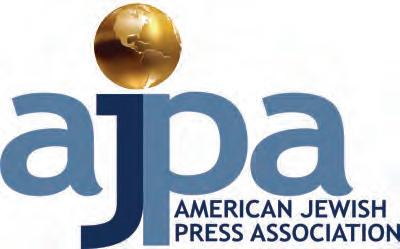
Manuscripts, letters, documents
for the return
and
such items.
loss
PITTSBURGHJEWISHCHRONICLE.ORG PITTSBURGH JEWISH CHRONICLE DECEMBER 23, 2022 3 Headlines
PRODUCTION Jeni Mann Tough Production Manager Carl
Art/Production Coordinator
5915 Beacon St., 5th Floor Pittsburgh, PA 15217 Main phone number: 412-687-1000 Subscriptions: 410-902-2300, ext. 1
Weigel
Subscriptions subscriptions@pittsburghjewishchronicle.org 410-902-2300, ext. 1 Published every Friday by the Pittsburgh Jewish Publication and Education Foundation 5915 Beacon St., 5th Floor Pittsburgh, PA 15217 Phone: 412-687-1000
SUBSCRIPTIONS subscriptions@pittsburghjewishchronicle.org 410-902-2300, ext. 1 TO ADVERTISE advertising@pittsburghjewishchronicle.org 724-713-8874
DEPARTMENT
POSTMASTER: Send address change to PITTSBURGH JEWISH CHRONICLE, 5915 BEACON ST., 5TH FLOOR PITTSBURGH, PA 15217 (PERIODICAL RATE POSTAGE PAID AT PITTSBURGH, PA AND AT ADDITIONAL MAILING OFFICES) USPS 582-740 newsdesk@pittsburghjewishchronicle.org
photographs sent to the Pittsburgh Jewish Chronicle become the property of this publication, which is not responsible
or
of
The Pittsburgh Jewish Chronicle does not endorse the goods or services advertised or covered in its pages and makes no representation to the kashrut of food products and services in said advertising or articles. The publisher is not liable for damages if, for any reason whatsoever, he fails to publish an advertisement or for any error in an advertisement. Acceptance of advertisers and of ad copy is subject to the publisher’s approval. The Pittsburgh Jewish Chronicle is not responsible if ads violate applicable laws and the advertiser will indemnify, hold harmless and defend the Pittsburgh Jewish Chronicle from all claims made by governmental agencies and consumers for any reason based on ads appearing in the Pittsburgh Jewish Chronicle
Email:
BOARD OF TRUSTEES
Adam Reinherz can be reached at areinherz@pittsburghjewishchronicle.org.
p From left: Richard Kantrowitz, Roberto Clemente and Ken Kantrowitz (Richard's brother) Photo courtesy of Sam Kantrowitz
Survivor of Poway attack grateful for Pittsburgh’s support
By Adam Reinherz | Staff Writer
Tragedy can create new bonds. In the case of Californian Hannah Kaye, it has made Pittsburgh a “second home.”
During the past four months Kaye, 25, has visited twice: In September, she came to Pittsburgh for the Eradicate Hate Global Summit; in October she traveled here for the communitywide commemoration of the Pittsburgh synagogue shooting
Both times Kaye was encouraged by friends and “soul sisters” to make the trek. They told her, she said, that people in Pittsburgh understand what it means to lose loved ones to antisemitic violence.
On April 27, 2019 — six months after the massacre at the Tree of Life building — Kaye’s mother, Lori Gilbert-Kaye, was attending services at the Chabad of Poway when a gunman entered the building and began shooting. Three people were injured.
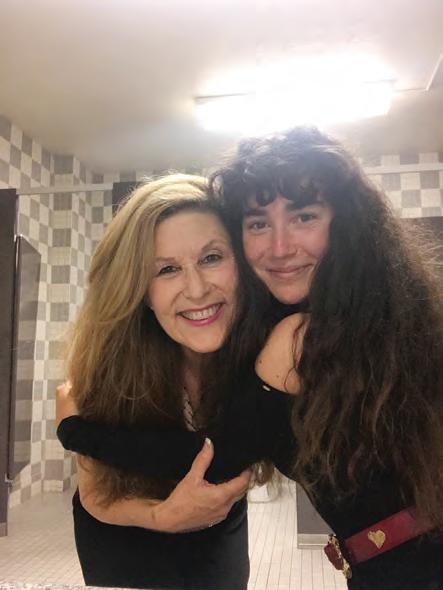
Gilbert-Kaye was murdered. Hannah Kaye and her father, Dr. Howard Kaye, were present during the attack and survived.
Six months later — when it came time to mark a year since the Pittsburgh synagogue shooting — Kaye and her aunt, Randi Grossman (Lori Gilbert-Kaye’s sister), drafted a letter to the community. The message made its way to Maggie Feinstein, director of the newly-created 10.27 Healing Partnership.
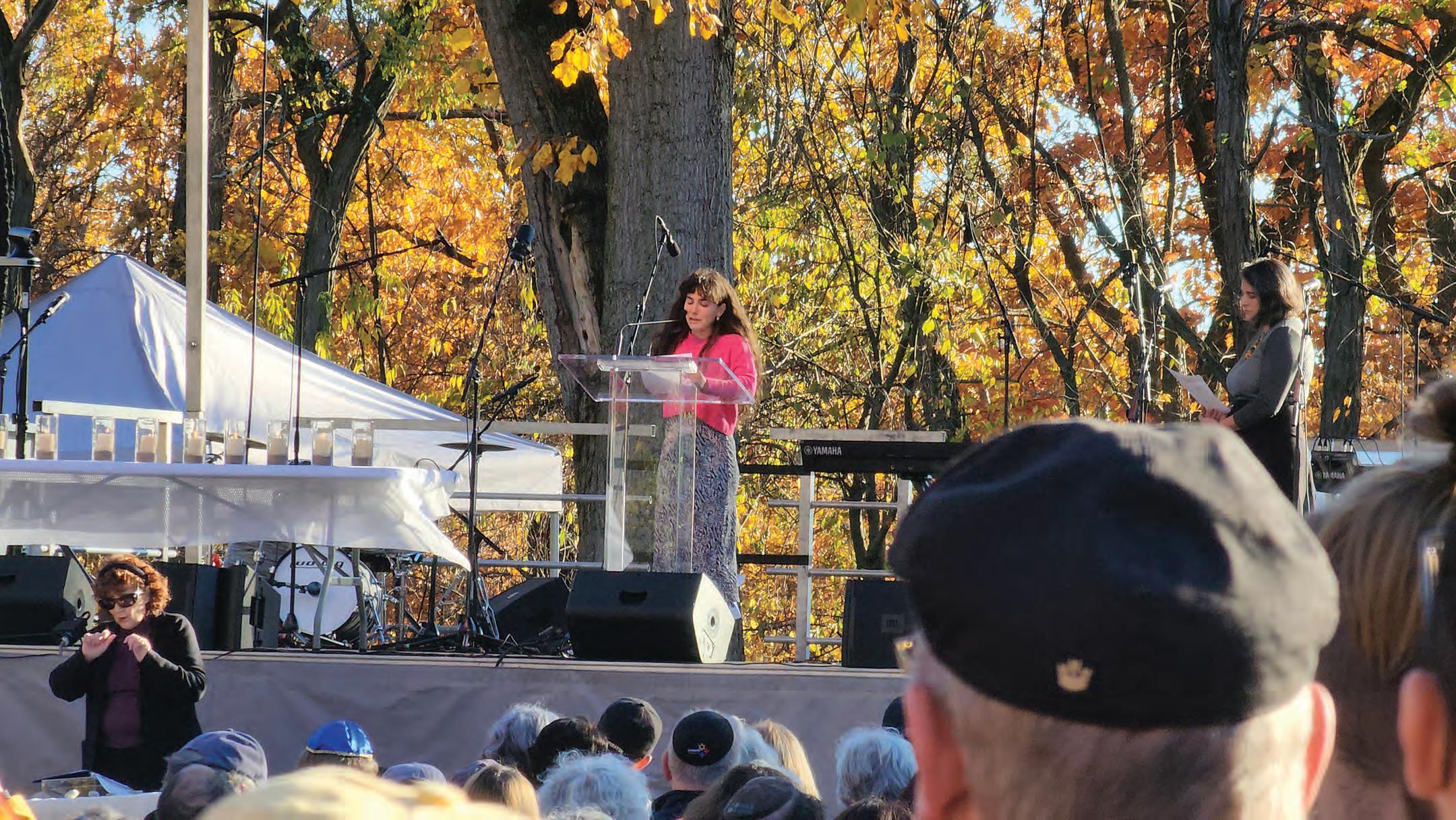
Feinstein replied and a correspondence developed. For the next 2½ years, communication continued. On yahrzeits and special occasions, Kaye and Feinstein exchanged messages.
Never phone calls or Zooms. “Just the written word,” Kaye said.
With Kaye’s permission, Feinstein shared the emails with families who lost loved ones during the attack at the Tree of Life building. Then Kaye began connecting with others in Pittsburgh.
“The connections we had were already instant in terms of our experience of loss,” she said. “For me personally, as a survivor — because I also was there at the shooting; I witnessed my mother’s assassination — meeting other survivors of such a similar circumstance, for me, personally, I feel an instant bond, instant connection, instant kinship that is hard to replicate with anyone else in my life.”
Befriending Pittsburghers has been “incredibly meaningful and soul-affirming,” Kaye continued. “I know it’s different for others, but in my personal embodied experience I wasn’t really connected to a lot of other survivors, let alone survivors of antisemitic hate crime violence, gun violence. So I feel like when I meet other survivors — especially the survivors that I’ve had the pleasure and the privilege of meeting — it feels as
rise early.
“From the moment I woke up, 10/27, the families, the survivors, the victims, were on my mind and heart every moment of the pilgrimage of coming to Pittsburgh,” she said.
incredibly emotional; but not in a bad way, just in a way of profound sorrow, grief, but
Kaye ascended the podium and recited the Hebrew words of the Mi Shebeirach before repeating the prayer — and the divine call to send a swift and complete healing of body and spirit — in English.
“The reason why it was such an honor that I was asked to do this is because I felt like I was doing it on behalf of my mother,” Kaye said. “I felt like I was able to bring my mother with me during that experience. And there’s no words to articulate or describe the language, the profoundness, of that.”
Kaye arrived at Schenley Park shortly after the program began. Her role, which was slated to occur midway through the commemoration, was to recite the Mi Shebeirach prayer — a request that God deliver strength and healing. As Kaye reached the side of the stage, “the tears came through me,” she said. “And I just felt
also gratitude for being able to be present.”
“Watching the ceremony unfold, and just the extraordinarily beautiful and stunning ways that the survivors and their community came together to honor the 11 victims and your community itself, it just moved me,” she continued. “It moved me tremendously so.”
Kaye said she isn’t sure how she can repay Pittsburgh for its kindness. She hopes people here understand how much solidarity and appreciation she holds, and added: “Myself and my family are here for you, and with you, not just on 10/27 — of course on 10/27 — but on every day, every day forever.”
Adopting an eternal responsibility is “a gift and essential,” Kaye continued. “I consider you my brothers and sisters and family, mishpacha.” PJC
Adam Reinherz can be reached at areinherz@pittsburghjewishchronicle.org.
4 DECEMBER 23, 2022 PITTSBURGH JEWISH CHRONICLE PITTSBURGHJEWISHCHRONICLE.ORG Headlines
— LOCAL —
p Hannah Kaye recites the Mi Shebeirach prayer — a request that God deliver strength and healing.
www.pittsburghjewishchronicle.org
Photo by Adam Reinherz
“From the moment I woke up, 10/27, the families, the survivors, the victims, were on my mind and heart every moment of the pilgrimage of coming to Pittsburgh.”
–HANNAH KAYE
Jason Haberman named chief of Mt. Lebanon Police Department
By Justin Vellucci | Special to the Chronicle
AJewish law enforcement officer with 25 years of experience will be Mt. Lebanon’s next police chief.
Mt. Lebanon Municipal Manager Keith McGill will appoint Jason S. Haberman police chief, with a ratification vote scheduled for Jan. 3. Haberman succeeds Police Chief Aaron Lauth, who retired in May.
“The area is home to me — I grew up with a lot of friends and family in Mt. Lebanon. It’s a big part of my life,” Haberman told the Chronicle. “The greatest privilege is to serve those who serve.”
Haberman has worked in law enforcement since starting patrol work with the Edgewood Police Department in 1997. After time with police departments in Wilkinsburg and with the Port Authority of Allegheny County, Haberman joined the Mt. Lebanon squad in 2018 as deputy chief.
“Jason has been an important part of our police department,” McGill said in a prepared statement. “He led the department in its goal of achieving accreditation in the state of Pennsylvania and he is developing a multi-disciplinary team for response to mental health and behavioral health calls.
“He is part of the culture of excellence and continual improvement that exists at the Mt. Lebanon Police Department and he has outstanding relationships with all of our partner organizations, including the Mt. Lebanon School District,” McGill added.
Haberman has a master’s degree in legal studies with an emphasis on homeland security and a Bachelor of Arts in criminal justice, both from La Roche University. He is a 2015 graduate of the FBI National Academy and holds a post-graduate law enforcement leadership certificate from the University of Virginia.

Haberman grew up attending and became a bar mitzvah at Beth El Congregation of the South Hills.
“It’s worth mentioning – it’s a big part of who I am,” Haberman said. “It’s part of my upbringing and my belief system.”

When the Oct. 27, 2018, synagogue shooting occurred — which happened during his tenure in Mt. Lebanon — Haberman felt a shift toward becoming a protector for the municipality’s Jewish population, he said.
In 2019, Haberman traveled to Israel to learn about security tactics and measures there.
“It was a tremendous experience, to be able to go there … and glean best practices,” he said. “Not to mention the incredible
experience of being in Israel.”
Rabbi Aaron Meyer of Temple Emanuel of South Hills said Haberman has a strong relationship with area Jews — but his service does not end there.
“Jason Haberman has worked tirelessly to keep the Jewish community — among many others — safe since his arrival at the

Local organizations receive state security grants
Gov. Tom Wolf announced just over $3.9 million in funding to support security enhancement projects for 93 nonprofits, including several Jewish institutions in Pittsburgh and surrounding areas.
“While it’s a shame this has been necessary, I’m proud to have secured nearly $20 million over the past three years to protect Pennsylvania’s diverse and vulnerable communities from hate-driven violence,” Wolf said in a prepared statement. “I look forward to the day when the goodness of humanity prevails.”
Wolf signed House Bill 859 to create the Nonprofit Security Grant Program in November 2019, one year after the Pittsburgh synagogue shooting.
Administered by the Pennsylvania Commission on Crime and Delinquency,

the program supports grants to nonprofits that principally serve individuals, groups or institutions included within “a bias motivation category for single bias hate crime incidents,” as identified by the FBI’s Hate Crime Statistics publication, such as race/ethnicity/ancestry, religion, sexual orientation, disability, gender and gender identity.
Applicants were eligible to apply for grant awards ranging from $5,000 to $150,000 for security enhancements. Funding can be used for safety and security planning, safety and security equipment and technology, training, building upgrades, vulnerability and threat assessments, and other security enhancements.
Local organizations receiving grants include:
• Adat Shalom B’nai Israel/Beth Jacob Inc., $25,000
• Ahavath Achim Congregation, $20,000
• Chabad House on Campus, Inc., $25,000
• Chabad of Squirrel Hill, $150,000
• Community Day School, $25,000
• Jewish Family and Community Services, $24,683
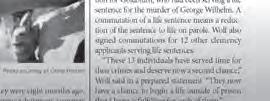


• Jewish Federation of Greater Pittsburgh, $67,820

• Temple Emanuel of South Hills, $42,481
• The Friendship Circle of Pittsburgh, Inc, $150,000
Mt. Lebanon Police Department,” Meyer told the Chronicle.

“From an active and meaningful response to the events of Oct. 27, 2018, to advising and training Temple Emanuel’s staff and congregants in best practices regarding security and situational awareness, Chief Haberman is an advocate, ally and leader in the South Hills community.” PJC
Justin Vellucci is a freelance writer living in Pittsburgh.
• The Jewish Spark, $75,000
• Tzohar Arts, $25,000
• Yeshivath Achei Tmimim of Pittsburgh, $25,000

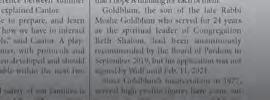

• Congregation B’nai Abraham, $25,000
• Congregation Emanu-El Israel, $25,000
PCCD plans to release another Nonprofit Security Grant Fund Program solicitation in January. More information about PCCD’s Nonprofit Security Grant Fund Program and the application process can be found on PCCD’s website. PJC
Toby Tabachnick
PITTSBURGHJEWISHCHRONICLE.ORG PITTSBURGH JEWISH CHRONICLE DECEMBER 23, 2022 5 Headlines
— LOCAL —
p Officer Jason S. Haberman Photo courtesy of the Municipality of Mt. Lebanon
“The greatest privilege is to serve those who serve.”
–JASON S. HABERMAN
— LOCAL — STORIES COME TO life HERE. Connect with Pittsburgh Jewish Chronicle. In your mailbox or all the time online at pittsburghjewishchronicle.org 5915 Beacon Street, 5th Floor, Pittsburgh, PA 15217
Submit calendar items on the Chronicle’s website, pittsburghjewishchronicle.org. Submissions also will be included in print. Events will run in the print edition beginning one month prior to the date as space allows. The deadline for submissions is Friday, noon.



q FRIDAY, DEC. 23 – DEC. 30
New Light Congregation’s New Light Memorial Chapel is open for public visitation each Monday and Friday in December from 10 a.m. to 2 p.m. Visitors are welcome to experience the space, reflect and learn more about New Light Congregation. In addition to the hours during December, the chapel is also available to the public by appointment. Contact New Light Congregation at 412-421-1017 for more information and scheduling. 750 Soose Road, Shaler Township, 15209. newlightcongregation.org.
q MONDAY, DEC. 26
Congregation Beth Shalom, along with Gift of Life, is hosting a bone marrow donor drive at the Squirrel Hill JCC. A simple cheek swab can save a life! Contact swoldenberg@bethshalompgh.org with any questions. 9 a.m. – 3 p.m. bethshalompgh.org/ bone-marrow-and-blood-drive.
Join the Jewish Community Center of Greater Pittsburgh for a Mini-Mitzvah Day Blood Drive Schedule your life-saving appointment at either the South Hills or Squirrel Hill location. For the South Hills location, register at jewishpgh.org/ event/mini-mitzvah-day-blood-drive-south-hills-jcc and use code C438. For the Squirrel Hill location, register at jewishpgh.org/event/mini-mitzvah-dayblood-drive-squirrel-hill-jcc and use code C189. 9 a.m. – 1:30 p.m.
q MONDAYS, DEC. 26 – FEB. 13
Join Congregation Beth Shalom for a weekly Talmud study. 9:15 a.m. For more information, visit bethshalompgh.org.


q TUESDAYS, DEC. 27 – FEB. 14
Join Temple Sinai for a weekly Talmud class with Rabbi Daniel Fellman. Noon. On-site and online. For more information and for the Zoom link, contact Temple Sinai at 412-421-9715.






q SUNDAYS, JAN. 8 – FEB. 5
Join a lay-led online Parashah study group to discuss the week’s Torah portion. No Hebrew knowledge needed. The goal is to build community while deepening understanding of the text. 8:30 p.m. For more information, visit bethshalompgh.org.
q MONDAY, JAN. 9
Join Temple Sinai for Make ‘n’ Eat Monday Nights — A Year of Spices sponsored by the Women of Temple Sinai. January’s spice is cumin, with instructor Annie Weidman. The instructor will lead students in making a meal so everyone can eat together and taste the featured spice. 6 p.m. $15. templesinaipgh.org/event/ spicecooking.html.
q MONDAYS, JAN. 9 – MAY 15
Understanding the Torah and what it asks of us is one of the most important things a Jew can learn. But most Torah classes begin in Genesis and never finish the first book. If you want a comprehensive overview of the whole Torah, Torah 1 is the course for you. In the first year of this two-year Zoom course, Rabbi Danny Schiff
will teach Genesis, Exodus and the first half of Leviticus. In the second year, he will complete Leviticus and cover Numbers and Deuteronomy. $225. 9:30 a.m. foundation.jewishpgh.org/ torah-1.
q TUESDAY, JAN. 10
Are you a senior with your afternoons free? Temple Sinai is starting a new activity just for you — Lunch and a Movie. Join them for Moroccan food and enjoy the classic movie “Casablanca.” $10. Noon. Register at templesinaipgh.org/event/ SeniorLunchMovie.html.
q THURSDAY, JAN. 12
Join Classrooms Without Borders for a postfilm discussion of “Liga Terezin,” with Oded Breda, Michael Schwartz and moderated by Avi Ben Hur. “Liga Terezin” is a documentary that tells the incredible story of the soccer league which took place in Ghetto Theresienstadt, 40 miles northwest of Prague. 3 p.m. cwbpgh.org/event/ post-film-discussion-liga-terezin.
Save the date for NCJW’s conversation with local romance novelist Lainey Davis Enjoy an evening of cocktails and tales while learning about the writing process, hear an author-read excerpt and ask questions. 5 p.m. Registration details to follow. ncjwpghevents.org/ upcoming-events.
q SATURDAY, JAN. 21
Join Temple Sinai for a special concert with musician Eliana Light. Great for all ages.

Free and open to the public. Registration required. 7 p.m. templesinaipgh.org/event/ ElianaLight.

q SUNDAY, JAN. 29
Join Temple Sinai and award-winning author Lisa Barr on Zoom to discuss her book, “Woman on Fire.” 6 p.m. Free. Register at templesinaipgh.org/event/ LisaBarr.html.
q MONDAY, JAN. 30
Join Beth El Congregation of the South Hills for an evening with award-winning author and expert on antisemitism Dr. Jud Newborn. He will discuss the topic “The White Rose Anti-Nazi Resistance and Heroes Today in the Fight for Democracy.” The event will begin with a wine and cheese reception, followed by the lecture. Virtual options are available. Please include your preference by Jan. 23 on the reservation form.
7 p.m. 1900 Cochran Road, 15220. Free. forms.gle/xeMTmZ3ZBfQqshzh9.
q WEDNESDAYS, FEB. 8 – MAY 24
Registration is now open for “Melton Core 1: Rhythms and Purposes of Jewish Living.”




This 25-lesson course will take you through the year’s cycle — the life cycle traditions and practices that bind us together. Explore not just the what is and how is of Jewish living, but the why is that go with them.
7 p.m. $300 per person, per year (25 s essions), includes all books and materials. Virtual. foundation.jewishpgh.org/ melton-core-1. PJC
Join the Chronicle Book Club!
Jewish Pittsburgh of connecting 60 years
Join the Pittsburgh Jewish Chronicle in celebrating its diamond anniversary! We invite you to help the Chronicle commemorate its first 60 years in a special feature section to be published Dec. 30 The section will take a look back at the last six decades through the photos, stories and advertisements that helped define our community and will set the stage for our next 60 years.
From local events to world affairs, from births to deaths and everything in between, the Chronicle has been the eyes and ears of Jewish Pittsburgh since 1962. We remain dedicated to serving you, our readers, and continuing to provide the news you need and the stories you want to read.
That’s something to celebrate.
To 120!
Phil Durler, Senior Sales Associate pdurler@pittsburghjewishchronicle.org | 724.713.8874
The Pittsburgh Jewish Chronicle invites you to join the Chronicle Book Club for its Jan. 8 discussion of “The Escape Artist: The Man Who Broke Out of Auschwitz to Warn the World,” by Jonathan Freedland. From Barnesandnoble.com: “Award-winning journalist and bestselling novelist Jonathan Freedland tells the incredible story of Rudolf Vrba — the first Jew to break out of Auschwitz, a man determined to warn the world and pass on a truth too few were willing to hear — elevating him to his rightful place in the annals of World War II alongside Anne Frank, Primo Levi, and Oskar Schindler and casting a new light on the Holocaust and its aftermath.”
Your Hosts:
• Toby Tabachnick, editor of the Chronicle
• David Rullo, Chronicle staff writer
How and When: We will meet on Zoom on Sunday, Jan. 8, at noon.
What To Do: Buy: “The Escape Artist.” It is available at area Barnes & Noble stores and from online retailers, including Amazon and Barnes & Noble.
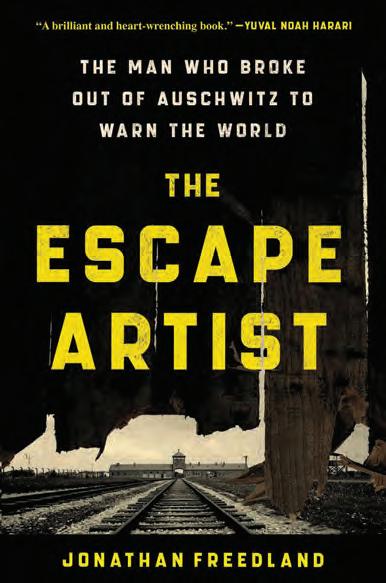
Email: Contact us at drullo@pittsburghjewishchronicle.org, and write “Chronicle
Book Club” in the subject line. We will send you a Zoom link for the discussion meeting.

We hope you enjoy the book. PJC
Toby Tabachnick
6 DECEMBER 23, 2022 PITTSBURGH JEWISH CHRONICLE PITTSBURGHJEWISHCHRONICLE.ORG Calendar
Feature
Ad
Section: Dec. 30
space deadline: Dec. 23
Special Pullout Section
By David Rullo | Staff Writer
The parallels were obvious: A small group of determined men and women defending their ideals, fighting against a larger, better-funded organization, accused of being more concerned with maintaining the status quo than justice.
The fact that the smaller group chose to meet at a temple and lit candles shortly after sundown only added to the similarity.
When Andrew Goldstein stood and addressed the dozen celebrants who gathered at Temple Sinai on Dec. 19, he met the Chanukah comparison head-on.
“Chanukah is about a small group of people standing up to a bully,” Goldstein said. “People who really believe in who they are and what they do and standing up to what was, in their time, one of the great armies of the world.”




Goldstein is a member of the Newspaper Guild of Pittsburgh and a writer at the Pittsburgh Post-Gazette. The Guild — along with members of the Teamsters, Pittsburgh Typographical Union, Pittsburgh Newspaper Printing Pressmen/Paper Handlers; Pittsburgh Mailers and Newspaper; Newsprint, Magazine and Film Delivery Drivers Helpers and Handlers’ unions — all went on strike on Oct. 6, protesting proposed changes in health insurers and benefits, and cuts to wages and senior employees’ vacation time.
And while the striking workers aren’t the Maccabees and P-G Publisher John Block isn’t Assyrian King Antiochus IV attempting to Hellenize his Jewish subjects, Goldstein said the last few months have been hard as he and his coworkers have gone “without pay and health care.”
Goldstein thought a holiday party that included latkes, doughnuts and a menorah lighting might be the pick-me-up the group needed.
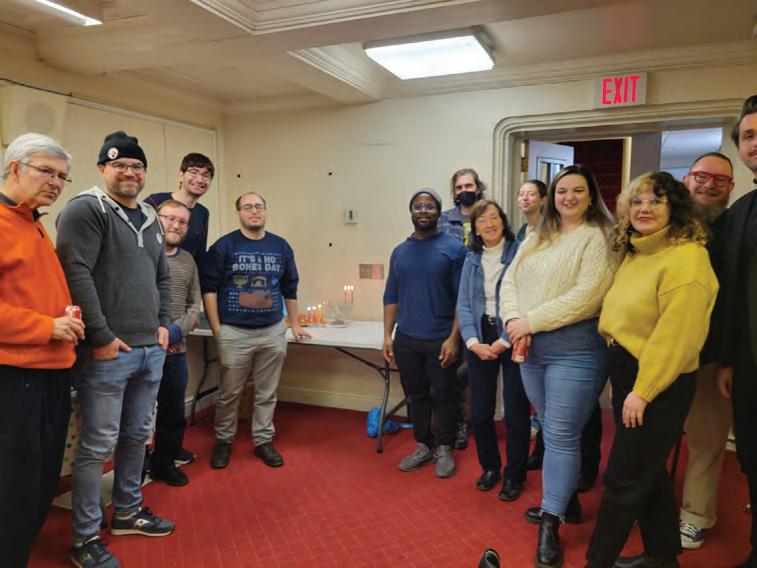
“I figured that Chanukah would be a good time to have people come together and do something fun and celebrate, have some food, have some drink together and kick back with a relaxed evening because we’re all stressed, we’re all tired and we’re all anxious about the future,” he said.
The fact that most of those in attendance were not Jewish mattered little to Goldstein who said the intention of the evening was to find hope and bring light to the darkness.

Newspaper Guild of Pittsburgh President Zack Tanner said he attended the Chanukah celebration, despite not being Jewish, for the sense of unity.
“Being on strike is a real solidarity-building event,” he said. “There’s a lot of togetherness there, and I think events like this bring people together.”
Sounding a bit like Mattityahu, one of the Jewish priests struggling against the Assyrian army, Tanner said there is joy in the comradery.
“When all of us are standing together, fighting together, that feels really good,” he said. “It feels really good to stand up and say, ‘Here are our demands, this is what we’re fighting for and why we’re fighting.’”
John Santa, who works on the P-G’s news desk, called the gathering “bittersweet.”







“It’s inspiring to be with all these people and see all the good things we’re doing that are coming out of the strike,” he said, “but I’d be lying if I said it wasn’t difficult.”
Marian Needham, an executive vice president with the national NewsGuild who was in town for negotiations with the P-G, said it might take a miracle akin to a single night’s worth of oil lasting eight days to end the strike anytime soon.
“This is the fourth session and, in each of those instances, the employer’s representative, who is an attorney — the employer doesn’t even bother coming to the table — says, ‘We’re happy with our proposal,’” she said.
Taking another message from the holiday, Goldstein said that Chanukah means “rededication.”
“I stand here amazed with this incredible group of people,” he said. “It makes me want to rededicate myself to all of you, to this union, to journalism here in Pittsburgh. There’s a lot of symbolism here, and I’m proud to be here with all of you.”
On Dec. 6, the P-G reported that, according to management, 2007 was the last profitable year for the paper, which has lost almost $264 million over the past 17 years. PJC
David Rullo can be reached at drullo@ pittsburghjewishchronicle.org.
PITTSBURGHJEWISHCHRONICLE.ORG PITTSBURGH JEWISH CHRONICLE DECEMBER 23, 2022 7 Headlines It’s your journey. You have the power of choice. Sivitz Hospice & Palliative care provides comforting, compassionate care to individuals with life-limiting illnesses in your home or another location of your choice. It is our privilege to care for you with a holistic approach at the end of life. For more information, visit jaapgh.org or call 412-422-5700. 200 JHF Drive | Pittsburgh, PA 15217 | jaapgh.org JAA429_PJC_Sivitz-FINAL.indd 1 12/15/22 2:15 PM
Post-Gazette
Striking
workers
— LOCAL —
p Striking Post-Gazette workers stand around the Chanukah candles at Temple Sinai.
Photo by David Rullo
New House bill aims to establish National Patient Safety Board
gain consensus on patient safety measures, autonomous data collection technologies and solutions.

If the Pittsburgh-based Jewish Healthcare Foundation has anything to say about it, patients might soon have less concern over the possibility of medical errors. That’s because earlier this month, U.S. Rep. Nanette Barragan (D-California) introduced H.R. 9377 — the National Patient Safety Board Act — a piece of legislation to establish an independent federal agency dedicated to preventing and reducing health care-related harms.

The law would create a nonpunitive, collaborative, independent agency modeled in part after the National Transportation Safety Board and Commercial Aviation Safety Team to address safety in health care.
The new agency will augment the work of federal agencies and long-standing patient safety organizations, according to JHF officials. It will create the Healthcare Safety Team, a public/private partnership to
The NPSB will focus on problems like medication errors, wrong-site surgeries, hospital-acquired infections, errors in pathology labs and issues in transition from acute to long-term care.
A national coalition of various stake holders, led by the Pittsburgh Regional Health Initiative, has advocated for H.R. 9377.
PRHI was founded in 1998 as an operating arm of the Jewish Healthcare Foundation. It is one of the nation’s first regional collaboratives of medical, business and civic leaders organized to address health care safety and quality improvements as a social and business imperative.
“The Foundation’s work through the Pittsburgh Regional Health Initiative has focused on the problem of prevent able harm in health care for decades,” Karen Wolk Feinstein, president and person of the NPSB Advocacy Coalition, told the Chronicle. “But in all my years addressing this issue of medical errors, I have not seen a coalition like this come together and unite around a common, focused direction. It reflects a lot of work — all of it is somewhat unprecedented for us — but always reassuring and
invigorating. The pandemic has created a new crisis with the resignations and retirements of frontline health care workers, creating a frightening increase in medical errors. The time for a national entity focused entirely on preventing harm before it occurs is now.” PJC
Federation sponsors Mini Mitzvah Day
Mitzvah Day — a Jewish Federation of Greater Pittsburgh tradition since 1998 — will look a little different this year.
Dubbed Mini Mitzvah Day, community members can donate blood at both the Squirrel Hill and South Hills locations of the Jewish Community Center of Greater Pittsburgh on Dec. 26. (Register at jewishpgh.org/series/mini-mitzvah-day.) Unopened, unexpired food items can also be donated at both locations for a food drive to benefit the JFCS Squirrel Hill Food Pantry.
Additionally, Gift of Life will be on-site at the JCC in Squirrel Hill to do quick cheek swabs so community members can be included in its bone marrow registry. Donors who are matches will be eligible to donate stem cells and bone marrow, potentially saving a patient’s life. No appointment is necessary.

In past years, Mitzvah Day, often held
THE BEST OF THE h IN YOUR EMAIL INBOX ONCE A WEEK.
Sign up on the right hand side of our homepage. pittsburghjewishchronicle.org
on Dec. 25, provided opportunities for hundreds of community members to volunteer at multiple organizations throughout the area. The format change this year is due to two converging factors, according to Adam Hertzman, the Federation’s director of marketing.
“It’s not a full-blown Mitzvah Day this year,” Hertzman said, pointing to the Federation’s discontinuation of its Volunteer Center as a major reason for the change. The Federation, he explained, is in a “transition period” between running a full Volunteer Center and developing a leadership program.
The second reason is due to the pandemic, Hertzman said. Because the day of programming is planned months in advance, it was difficult to predict what COVID “would look like in this time period.”
Hertzman said Federation officials have not yet decided on the direction of Mitzvah Day 2023. PJC
Toby Tabachnick
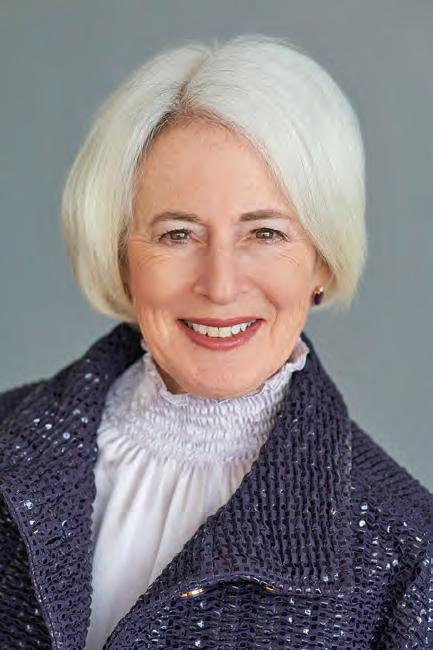
8 DECEMBER 23, 2022 PITTSBURGH JEWISH CHRONICLE PITTSBURGHJEWISHCHRONICLE.ORG Headlines In-Home Care Services Pittsburgh-247.ComfortKeepers.com Making
•Companionship • Light Housekeeping •Transportation and Errands • Personal Care Services Most offices independently owned and operated. • ©2015 CK Franchising, Inc.
Moments Matter
— LOCAL —
— LOCAL —
David Rullo
p Karen Wolk Feinstein Photo courtesy of the Jewish Healthcare Foundation
The pandemic has created a new crisis with the resignations and retirements of frontline health care workers, creating a frightening increase in medical errors.
–KAREN WOLK FEINSTEIN
A national survey found that Democrats are twice as likely as Republicans to agree that prejudice against Jews is a serious problem and that antisemitism poses a growing threat to Jews, JTA.org reported.
The divide between Republicans and Democrats in the Quinnipiac University survey released on Dec. 14 tracks with previous polling — but it also comes after weeks of antisemitic invective from the rapper and designer Kanye West, who now identifies as a Christian conservative and who has courted Republicans.
It also comes after former President Donald Trump, a Republican, dined with West, who is now known as Ye, and Nick Fuentes, a prominent Holocaust denier, and after multiple government and nonprofit groups mentioned spikes in reported attacks on Jews.
The survey showed that 83% of Democrats identified prejudice against Jews as a very serious or somewhat serious problem. Just 44% of Republicans agreed with those assessments. Overall, a substantive majority, 60%, agreed that prejudice against Jews is a serious problem.
A similar divide characterized a question about whether antisemitism “represents a growing threat to Jewish Americans,”


with 73% of Democrats saying that it does, opposed to 34% of Republicans. Overall, 51% of respondents said it represented a growing threat.
Turkey arrests 44, claims they are tied to Mossad
Turkey arrested 44 people on Dec. 14 for what officials claimed was their involvement with Mossad, the Israeli intelligence service, JTA.org reported, citing Turkish media.
Those arrested appear to be largely Turkish citizens, and the group includes several private detectives, as well as the director of a private detective firm named Ismail Yetimoglu. No Israelis were arrested.
According to Turkish media, those arrested are accused of shadowing Palestinians and pro-Palestinian organizations in Turkey. Israel has not publicly addressed the arrests.
The arrests come at a warm point in Turkish-Israeli relations, as the two countries recently exchanged ambassadors for the first time in years. This past spring, Mossad’s collaboration with MIT, the Turkish intelligence service, was touted as essential in ending a plot by an Iranian-backed terror cell targeting Israeli tourists in Istanbul.
To save a species, a Persian leopard moves to Israel
After arriving from France, 2-year-old Mademoiselle is acclimating to her new home before meeting her planned mate, Coresh, JNS.org reported.
Staff at the Ramat Gan Safari, near Tel
Aviv, had asked the public for suggestions for a name for the Persian leopard. She was previously in the Beauval Zoo in France’s Loire Valley, Ynet reported.
The leopards will be placed in the same den to familiarize themselves with each other’s scent. Once the safari crew determines that the couple is interested in the encounter, they will be permanently placed in a den together.
“The couple was not chosen as mates randomly,” said safari zoologist Keren Or, according to the report. “She has been intended for Coresh from birth based on specific information and family ties and has been trained in both French and English ahead of her arrival.”
The two felines will participate in a project to reproduce the species, which intends to populate European zoos with 200 leopards and release some of them into the wild.
UAE Jewish community opens first kosher supermarket in Gulf
More than 100 people gathered in Dubai on Dec. 12 as the United Arab Emirates’ Jewish community opened the first-ever kosher supermarket in the Gulf, JNS.org reported.
The supermarket, named “Rimon,” will meet growing demand for kosher products due to the significant increase in the number of Jews traveling and relocating to the UAE in the wake of the 2020 Abraham Accords.
“Our wonderful community, which keeps growing and prospering here in the UAE, most gratefully continues to benefit
Today in Israeli History
Dec. 23, 1907
—Stern Gang’s founder is born Avraham Stern, one of the most wanted members of the Jewish underground in Palestine, is born in Suwalki, Poland. He forms Lehi, known as the Stern Gang, to keep up antiBritish violence during World War II.
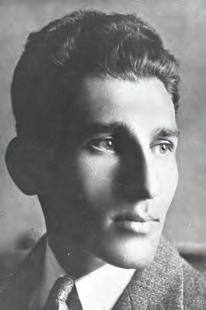
Dec. 24, 1969 — Missile boats are smuggled out of France
Israel uses a fake shipping company to purchase five military boats and sneaks them out of Cherbourg, France, defeating a French embargo that canceled the original purchase after the June 1967 war.
Dec. 25, 1918 — Anwar Sadat is born Anwar Sadat, the president who leads Egypt into the 1973 Yom Kippur War and signs a peace treaty with Israel in 1979, is born in Mit Abu al-Kum, Egypt. He is assassinated during a military parade in 1981.
from the extraordinary embrace we have received from the Emirates government and local authorities, for over a decade now,” UAE-based Rabbi Levi Duchman said.
“The unique Jewish supermarket, spanning over 130 square meters in the center of Dubai, offers quality kosher produce imported especially from Israel, Europe and the United States, including quality meat and chicken products under the highest Jewish quality standard with Kosher Mehudar certification,” Duchman added.
Survey: Israelis think Facebook is the most hateful social network
An Israel Internet Association survey published on Dec. 12 said that Israelis were more likely to experience hatred, harassment, the exposure of intimate details and violent discourse on Facebook than other social media outlets, The Jerusalem Post reported.
Of those surveyed, 82% of the Israelis exposed to hate speech online said Facebook was where the most instances occurred. Other platforms included WhatsApp at 26%, Instagram at 24%, Twitter at 17%, TikTok at 16% and YouTube and Telegram at 9%.
About one in five Israelis (22%) said they experienced swearing and abuse on social networks during the past year, while 18% of Israelis testified that they experienced surveillance or harassment over the same time. PJC
— Compiled by Andy Gotlieb
— El Al flight is attacked in Athens

Dec. 26, 1968
The Popular Front for the Liberation of Palestine attacks an El Al flight during a layover in Athens en route from Tel Aviv to New York. One passenger is killed.
Dec. 27,
2008 — Operation Cast Lead begins
Israel launches Operation Cast Lead after Hamas breaks a six-month cease-fire. The 22-day operation aims to stop rocket fire at civilians, Hamas terrorism and weapons
Dec. 28, 1917 — Britain names Storrs governor of Jerusalem
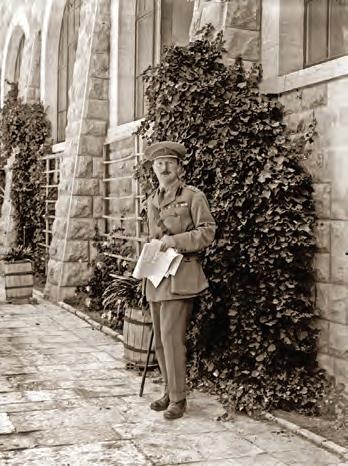
Gen. Edmund Allenby names Ronald Storrs the military governor of recently captured Jerusalem. An advocate for Arab interests, orrs remains the governor of Jerusalem and Judaea until 1926.
Dec. 29, 1946 — Irgun carries out Night
of the Beatings
Angry that the British administered 18 lashes to an Irgun member for his role in a bank robbery, the underground movement abducts British soldiers in several cities and flogs them 18 times each. PJC
PITTSBURGHJEWISHCHRONICLE.ORG PITTSBURGH JEWISH CHRONICLE DECEMBER 23, 2022 9 Headlines —
WORLD —
Items are provided by the Center for Israel Education (israeled.org),
— WORLD —
p Avraham Stern, who used the underground name Yair, is seen in January 1942, the month before his death.
Israeli Government Press Office
p Ronald Storrs poses in Jerusalem in 1920.
Courtesy of the G.
Eric and Edith Matson
We Prepare Trays for All Occasions HOMEMADE SALADS & SOUPS CATERING SPECIALISTS DELI PARTY TRAYS DELICIOUS FRIED CHICKEN UNDER THE SUPERVISION OF VAAD OF PITTSBURGH WE RESERVE THE RIGHT TO LIMIT QUANTITIES. BLOOMS ANIMAL CRACKERS 50¢ 1 OZ BNEI DAROM CUCUMBERS IN BRINE 13-17 $3.19 CAN OSEM BREAD CRUMBS $4.99 EA TASTE OF ASIA CURRIES $7.99 EA EMPIRE TURKEY PASTRAMI $10.99 LB BABA $7.99 LB GARLIC STUFFED OLIVES $7.99 LB HUMMUS $7.99 LB MEAT WINE SPECIALS HOURS BARTENURA PROSECCO $16.89 750 ML KEDEM CHAMPAGNE WHITE OR PINK $8.99 750 ML BEEF STEW $10 49 LB PEPPER STEAK $11 39 LB WHOLE FRYER $3.69 LB CUT UP FRYER $3.79 LB GROCERY DELI COOKED FOODS CHICKEN SOUP $10.99 QT SEAFOOD SALAD $12.95 LB SESAME CHICKEN $16.99 LB BBQ BEEF $14.99 LB STORE HOURS Sun. • 8 a.m. - 4 p.m. Mon.-Wed.• 8 a.m. - 6 p.m. Thurs. • 8 a.m. - 8 p.m. Fri. • 8 a.m. - 3 p.m. Happy New Year!
Photograph Collection
Survey: Democrats much likelier than Republicans to see antisemitism as problematic
Josh Shapiro transitions to governor’s office
By Jarrad Saffren | Contributing Writer

In late October and early November, as Josh Shapiro’s resounding victory over Doug Mastriano in the Pennsylvania governor’s race became apparent, a new narrative emerged about the Jewish Democrat: Could Shapiro become the future of the Democratic Party in the post-Joe Biden era? And could he run as early as 2024 or 2028?
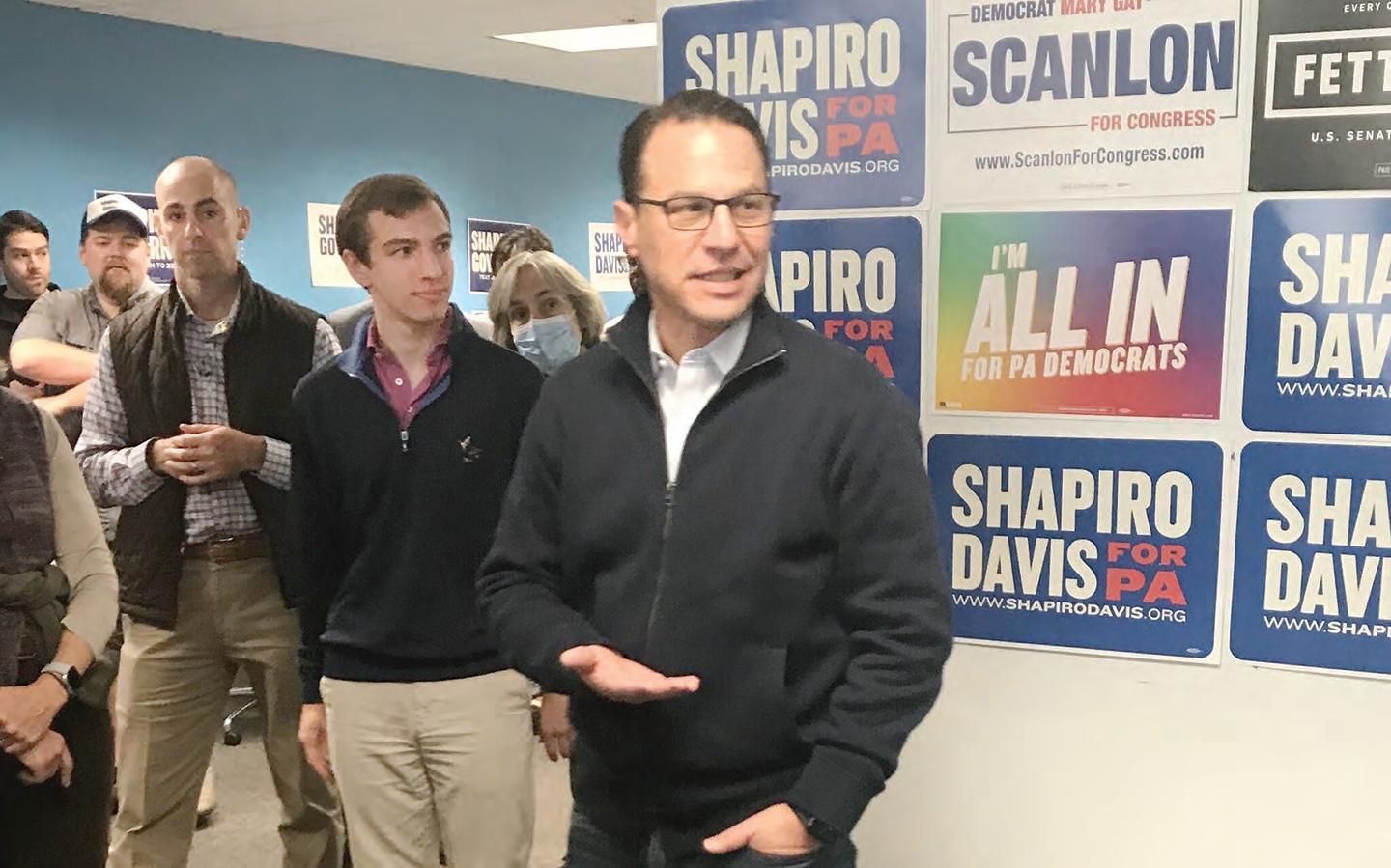
HuffPost and Rolling Stone both wrote stories along those lines. And they were not far-fetched, either. In his gubernatorial campaign that started in October 2021, Shapiro combined support for progressive culture war victories — like a woman’s right to choose to have an abortion — with support for more conservative approaches to practical issues, like hiring 2,000 more police officers to fight rising crime. And then he got more than 3 million votes and beat Mastriano by 15 percentage points.
But at Shapiro’s election night victory party at The Greater Philadelphia Expo Center in Oaks, his supporters demurred on 2024, saying their candidate might have to wait until 2028 to consider running for president. One woman even said 2032.
Shapiro also remains a great distance from Washington, D.C. The Abington resident and Beth Sholom Congregation member in Elkins Park has yet to serve a day as governor. But on Jan. 17, he will be inaugurated in Harrisburg, and the unglamorous work of delivering for Pennsylvanians will begin.
“Today, I stand before you, humbled and honored and ready to make this transition to serve as Pennsylvania’s next governor,” Shapiro said during a Nov. 16 press conference in Harrisburg with Gov. Tom Wolf, also a Democrat. “And now is when the real work begins to meet these expectations and deliver real results on our economy, on education and public safety.”
Shapiro, though, hasn’t detailed his plans for using his mandate from the commonwealth’s masses to build a safer, more prosperous Pennsylvania. Instead, he has spent the past month focusing on how to transition from the state office he holds, that of attorney general, to the one that will define his legacy in Pennsylvania.
At that Nov. 16 press conference, Shapiro said he will continue serving as attorney general until his inauguration. He mentioned that, by law, Deputy Attorney General Michelle Henry of Bucks County will take over once he takes the oath of
office as governor.
Shapiro added that he would announce his intention to nominate someone to the state Senate for consideration as attorney general. He did not make clear if that would be Henry, whom he selected in 2016 because she had the prosecutorial experience that he lacked at the time. (Shapiro had been a state rep and Montgomery County commissioner as well as a corporate lawyer.)
Between his campaign and his service as attorney general, Shapiro has worked two jobs at once for over a year. And since his victory on Nov. 8, he has continued with that heavy workload.
The Democrat’s office has announced a series of lawsuit victories that will bring millions of dollars in settlements to the Keystone State. There was $453 million from CVS and Walgreens for their role in
the opioid crisis, $38.8 million from JUUL for “deceiving consumers about e-cig safety” and more than $19 million from Google over its location tracking practices.
Shapiro used those types of wins to portray himself on the trail as a candidate who took on “big fights.” It seems evident that he intends to add to that reputation in his final months as the state’s top prosecutor.
As a candidate, he talked about himself as a leader who could bring a diverse coalition, in terms of race, income and political views, together. And he has tried to live up to that reputation in his effort to build a transition team.
The Philadelphia Gay News credited Shapiro with bringing on 13 members of the LGQBT+ community. His transition leadership board includes both CEOs, like
Gregory E. Deavens of the Independence Health Group, and labor leaders, like Angela Ferritto of the Pennsylvania AFL-CIO. And his team has brought in leaders from, as a recent transition email put it, Erie to Indiana to Philadelphia.
Since the Shapiro administration is not yet an administration, perception is reality … for now.
“We’re going to assemble a talented, hardworking, capable administration, one that looks like Pennsylvania,” Shapiro said.
“For anyone who’s willing to take off the red jersey and the blue jersey and just wear the Pennsylvania jersey — you’re welcome to be part of our team.” PJC
Jarrad Saffren writes for the Jewish Exponent, an affiliated publication where this first appeared.
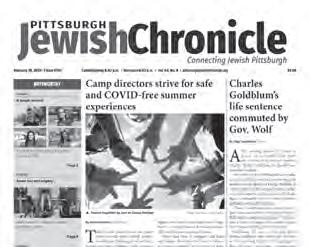
10 DECEMBER 23, 2022 PITTSBURGH JEWISH CHRONICLE PITTSBURGHJEWISHCHRONICLE.ORG Headlines
— LOCAL —
p Josh Shapiro talks to supporters at a canvass kickoff in Swarthmore on Oct. 8.
Photo by Jarrad Saffren
“For anyone who’s willing to take off the red jersey and the blue jersey and just wear the Pennsylvania jersey — you’re welcome to be part of our team.”
Every Friday in the and all the time online @pittsburghjewishchronicle.org. news JEWS CAN USE. For home delivery, call 410.902.2308.
–JOSH SHAPIRO
Seeking latitude to press liberal causes, the Jewish Council for
immigration rights, and abortion, because they were favored by the local JCRCs with which it consulted and which sent delegates to its annual conference. Those JCRCs often initiated liberal policies, in part because they were favored by an American Jewish grassroots that polls show trends over-
Another factor was the give and take in local community relations: Jewish groups seeking support for Jewish issues from Black, Latino, Asian American, and other minority groups were happy to reciprocate on those
But the JCPA’s profile on those issues has diminished in recent years; the smaller donor base triggered by the 2008 recession forced the vast majority of JCRCs to fold into their local federations and to reflect the priorities of the federation donor base as opposed to the congregations, Jewish labor groups and fraternal organizations that once drove the agenda for Jewish

ad declaring “Black Lives Matter.” That set off alarms among some conservative donors because of the anti-Israel positions adopted by some of the Black Lives Matter movement’s leading individuals and organizations.
As a result, JCPA and JFNA entered into talks about their shared future. Insiders said last year, as tensions burst into public view, that it was likely that the ailing JCPA would fold wholly into JFNA.
Instead, after a process that included officials from both groups as well as from local Jewish community relations councils, which are mostly controlled by their local Jewish federations, the decision was to tease apart the organizations. The decision means that JCPA will no longer officially speak on behalf of the community relations councils, and also will not draw dues from them or from the 16 national organizations that have funded it up to now.
But while the group will take on a fundraising challenge, those who engineered the new structure say it will also be insulated from the difficulties of arriving at a consensus in an increasingly polarized political environment.
Rabbi Doug Kahn, the retired longtime director of the San Francisco Jewish Community Relations Council who was a consultant in the restructuring, said the new arrangement is meant to offer a positive answer to the question, “Can we move forward in a way that enables us to be more impactful on our core issues, and more nimble at the same time, while retaining close relationships with our key stakeholders going forward?”
Maharat Rori Picker Neiss, who heads the St. Louis JCRC, was among a number of local community relations council directors who had lost hope that the JCPA could adequately represent them. Now she said, she was hopeful it could resume its role of convening a national Jewish consensus around critical issues.
“The model of consensus-building in the way that some of the mainstream organizations talk about it has really been consensus towards a very narrow group of voices that wants to claim representation of the entire Jewish community,” she said. The newly constituted JCPA “is opening itself up to what could be greater consensus in a sense of a much broader community than many of our models have allowed for.”
The brochure tied to the split indicates some of the issues on which the renewed JCPA will advocate. “JCPA will represent a strong independent voice within the American Jewish community on issues aimed at strengthening our democracy and commitment to an inclusive and just society out of the belief that such conditions are essential in a pluralistic society and for the well-being of the Jewish people and Israel,” it said. “The reset takes place against a backdrop of rising antisemitism, racism, bigotry and hate, and polarization, and continued threats to our democracy.”
The group is launching two new initiatives, both apparently likely to dismay conservatives. One would focus on “voting rights, election integrity, disinformation, extremism as a threat to democracy, and civics education.” The other would focus on “racial justice, criminal justice reform and gun violence, LGBTQ rights, immigration rights, reproductive rights, and fighting hate violence.”
Some of the 16 groups that have paid dues to the JCPA in the past are supporting the restructured group. The new JCPA will rely at first on a threeyear commitment from the UJA Federation of New York, one of the biggest pillars of the JFNA.
It’s not clear yet how the more conservative
among the 16 groups will react. Nathan Diament, the Washington director for the Orthodox Union, said his group would wait and see how the new JCPA develops. But he said he regretted the polarization that led to the change.
“The trajectory of that JCPA is a reflection of the of the broader trend, more than anything about the JCPA itself,” Diament said. “It’s harder to find consensus these days with regards to Israel, it’s harder to find consensus with regard to a large list of domestic policy matters. I mean, even while we were in the JCPA we were in the position of having to dissent on some prominent issues.”
David Bohm, the current JCPA chairman who led the restructuring talks, said the organization would remain nonpartisan — but acknowledged that it’s become harder to maintain the perception.
“In today’s polarized environment, people get accused of being partisan when they take a stand on any issue, so I don’t know if that can be totally avoided,” he said in an interview.
The JFNA in a statement welcomed the new configuration. “We look forward to continuing to work collaboratively with JCPA — as we always have — as it tackles issues of importance to Jewish communities in its new format.”
In an interview, Elana Broitman, JFNA’s senior vice president for public affairs, said the new configuration would allow the JCPA to delve deeper on its favored issues. “If the JCPA is focused on particular issues, they can perhaps go into more depth on those issues that they had the opportunity to before,” she said.
In the past, the JCPA has taken positions on issues like voting rights, gun control,
Tensions between the JCPA and the JFNA intensified in the summer of 2020, after a Minneapolis policeman murdered George Floyd, triggering civil rights protests and the “Black Lives Matter” ad by Jewish groups that JCPA signed onto.
The JFNA CEO, Eric Fingerhut, insiders said then, was not happy about having to explain to donors why JCPA was embracing a group identified closely with a movement perceived by some conservatives as radical and anti-Israel.
The new JCPA is betting that there are donors ready to support a progressive domestic Jewish lobby. In addition to the three-year grant from UJA-Federation, two other grants will come from a past chairwoman of the JCPA, Lois Frank, and its current chairman, Bohm.
Bohm, an attorney who assumed leadership of the JCPA in 2021, said the group would take a hit by losing the JFNA’s allocations and the dues it collects from the 125 community relations councils — but he expected to make it up with money from foundations invested in the JCPA’s new agenda, including from individual federations.
“We expect we may lose some funding,” he said. “We’re hoping it’s not significant.”
“We are beginning to hear from foundations that have not historically necessarily focused on community relations, but now recognize why that is such an important part in the toolkit,” Kahn added.
Bohm said the board would be independent and limited to 30 people. “We will continue to have board members who are either JCRC directors or current or past chairs of JCRCs, but they will not be representing their specific community,” he said in an email after the interview. “Instead they will represent the Jewish community relations field as a whole.”
PITTSBURGHJEWISHCHRONICLE.ORG PITTSBURGH JEWISH CHRONICLE DECEMBER 23, 2022 11 Headlines
Please see Council, page 15
p Dr. Rajwant Singh, founder and chairman of the Sikh Council on Religion and Education, center, speaks as he stands next to Rabbi Steve Gutow, president of the Jewish Council for Public Affairs, (left), and the Rev. Mel Kawakami, Sr. Minister of Newtown United Methodist Church in Newtown, Connecticut, right, during a National Vigil for Victims of Gun Violence just before the first anniversary marking the Sandy Hook Elementary School mass shooting at Washington National Cathedral on Dec. 12, 2013.
Photo by Matt McClain-Pool/Getty Images
No ‘one size fits all’ in protecting minorities
— EDITORIAL —
The announcement that the Biden administration is establishing an inter-agency group to coordinate U.S. government efforts “to counter antisemitism, Islamophobia, and related forms of bias and discrimination,” shows that the White House is interested in more than a ceremonial approach to address antisemitism. That’s a good thing. But the combination of so many different forms of bias — antisemitism, Islamophobia, antiBlack hatred, anti-Asian hatred, homophobia, transphobia and more — into a homogenized melting pot of a response risks not adequately dealing with the complexities of bias against any minority. The announced approach smacks of trying to please everyone. We are concerned that it will result in a response that will please no one.
Each minority community that is a proven target of the angry, resentful and mentally unbalanced hate-mongers who are pumped up by the steady drip of social media content and loose gun laws is different. Each is deserving of individualized attention and the development of a carefully tailored approach and response. Jews are no exception.
The attacks on Jews continue, with no end in sight. From spray-painted swastikas and antisemitic slogans to taunts, heckling and assaults of Jewish children and adults on the streets of our neighborhoods, each disturbing event triggers the Jewish trauma that our community is not safe. While we are pleased by the rise in government dollars earmarked for communal security and the increasing coordination between law enforcement and the security monitoring arms of Jewish communities, we worry that much more is needed.
The last piece of twine
things possible. This Chanukah is one of the last experiences we have to learn to let go, allowing my son to run toward the next part of his adventure.
Any plan of action must be based on accurate information. But it now appears that those responsible for keeping track of hate activity haven’t been able to gather reliable numbers. The FBI, for example, has been criticized for publishing incomplete data on hate crimes. Thus, the FBI reported a drop in antisemitic acts in 2021, while the ADL reported an alarming rise in such activities during the same time. It turns out that the reason for the disconnect is simple. The FBI relies on voluntary reports from law-enforcement agencies. But several major law-enforcement regions, including Los Angeles County, New York, Miami and Chicago, did not submit data for 2021. It is therefore no surprise that without reports from the very areas where most American Jews live, the FBI compilations cannot be accurate. Government officials have explained that many states and law enforcement agencies failed
to report on bias and hate activity properly or at all after a shift to a new reporting system. That means that the problem of antisemitism is worse than officials thought and probably closer to what we feel in our bones. And the same is almost certainly true for other minorities who are suffering from rising bias and attacks.
The bureaucratic blunder is disturbing. Even with the best of intentions, government cannot solve a problem that it doesn’t fully understand. And with the White House now proposing to deal with all forms of bias generically — rather than with deliberate focus on each minority community that is being targeted — we worry that the individualized and singular needs of each minority community, including the Jewish one, will not be addressed sufficiently. That would not be good for anyone. PJC
Ididn’t realize it was looming.
It was just a ball of twine woven around a cardboard roll. It should have meant nothing. Instead, as I wrapped what seemed like my 200th gift basket for another fundraiser, that roll of twine became the ending to a beginning
The roll of twine is 12 years old. It’s easy to remember because I bought it when my son started kindergarten and I began volunteering for the school’s Parent Faculty Organization. I used it to bind gift baskets for various craft projects and for his bar mitzvah.
The cardboard roll made its appearance a few weeks before Chanukah this year — the last Chanukah our son, Jack, will be exclusively ours — as I came to the last piece of twine.
My husband and I spent the past 18 years learning to let go a little at a time. I read somewhere that observing your child grow up is akin to slowly watching them run away from you and toward something — to all
Jack was born a few weeks prematurely. His father and I used to have to feed him teaspoons of formula while fighting to keep him awake. He grew quickly, and we learned to give up those early feeding struggles easily.
During Jack’s early years, I worked freelance from home. Jack sat on my lap and would even join my meetings. I still feel the vacant spot on my lap.
Jack eventually moved from my lap to the other side of the room. He sat at his dad’s desk and typed on the keyboard, learning his letters with less and less assistance. That time together ended when he started school and I had to give up my temporary office mate.
It was then that I bought the twine. I spent hours at PFO meetings and sitting behind booths at various functions. With each slice of the scissors, cutting twine for gift baskets or crafts, a bit of time was shaved from our time with our son.
Elementary school basket-wrapping quickly turned into middle school projects, art projects, makeshift posterboard presentations and bar mitzvah favors. Art has always played an essential role in my relationship with my son. Twine was the tie that bound.
We spent close to a year, several times a week, learning to chant the Torah together for his bar mitzvah. Jack picked up the Hebrew a little quicker than I did, but there were spots where my ear for music and melody was needed. When he stood before the congregation and perfectly chanted his portion and the Shabbat prayers, his pace was quicker than I could follow. His final note came too abruptly for me.
By high school, he was spending more time with friends and less time with us. I didn’t realize at the time that we were all learning to separate then, as well.
The twine I used so regularly, that had bound the two of us without either of us knowing, was thrown into a beat-up cabinet I inherited from my mother. The kind of brown, wooden, 1960s Sears cabinet, which was a little too large than it needed to be. The twine sat in that cabinet along with extra tea candles from our wedding, unused modeling clay and a glue gun that Jack and I had used for various projects. It was a holder of memories that I forgot I had stored away.
I knew the meaning of the cabinet’s contents. Memories are little pieces of ourselves we leave behind as we become the people we are. I’ve watched Jack grow from an infant to a child to a young man.
I’m a grown-up. I still love playing dreidel.
dreidel collection to Florida to play with him a week ago. “I spinned it good!” he declared.
Ilove playing dreidel. I love the randomness of it, how it hardly takes any skill once you’ve mastered twisting the top just right and letting it rip for a good, long spin.
I love how it equalizes the players. A 5-year-old could best a grown-up, as my great-nephew did when I brought my
Last year, I took my dreidels to Los Angeles and got a bunch of 30- and 40-somethings down on the floor for a game. A Russian immigrant who’d never played before beat us all. And this past weekend, I played with my soccer-loving twin cousins and their grandmother. One child won the first round; Grandma won the second.
I love how it makes us pay attention. My son’s college friends came over one Chanukah, all dressed up en route to an event much cooler than latkes at my house.
But even they spent a good long while spinning dreidels in crazy swirling loops on my old parquet floor.
I love how beautiful it is when a dreidel really gets going, how we can’t help but smile when it spins so fast that it’s just a blur, and the relief we feel — even when we lose — when it finally slows and drops and reveals the player’s fate.
The Hebrew letters
And I love how it connects us to Chanukah. The letters on each of the dreidel’s four sides — nun, gimel, hey, shin — sign the story in Hebrew (Nes gadol haya sham, meaning “A
Sometimes I’ve participated in that growth; other times, he pushed me away. But I know I have opportunities left to share in his growth.
This Chanukah, I can’t help but think that in the circle of annual life cycle events, this is the last Chanukah where my son is this adolescent version of himself. We’ll always be mother and child, but that change matters. When the twine is completely unrolled from its cardboard core, both remain, but the relationship is forever different. I would never want to rewind that string; sometimes, though, I wish I had paid more attention or moved a little more slowly when unrolling it from its core.
Jack will soon be 18 — a significant Jewish number. I recognize that this twining melancholy is part of the beauty of life and parenthood, like a slowly unwoven spool, giving pieces of us away. I always knew this time would come. Hopefully though, the unrolled twine built a tapestry of memories bringing joy and growth. Eighteen, a lifetime. Eighteen: L’chaim, to life. PJC
Kim Rullo is communications manager and an associate at Rothschild Doyno Collaborative. She is a conceptual artist and photographer who has curated work in the Pittsburgh Cultural District and has had several art shows throughout the city.
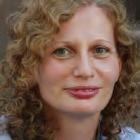
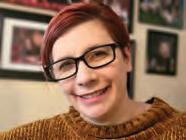
great miracle happened there”). But they also supply directions in Yiddish for how to play: nisht (nothing), gants (all), halb (half), shtel (put).
But then I get to thinking: Playing dreidel is so un-Jewish. It’s not about merit or skill, or hard work, or talent, or doing some good deed — all things we value religiously and culturally. It’s just about whether your dreidel lands on nun, gimel, hey or shin. Maybe you’ll have to put a penny in, or maybe you’ll get half the pot. Maybe you’ll get everything — or maybe you’ll end up with nothing.
12 DECEMBER 23, 2022 PITTSBURGH JEWISH CHRONICLE PITTSBURGHJEWISHCHRONICLE.ORG Opinion
Guest Columnist Kimberly Rullo
Guest Columnist Beth Harpaz
Please see Harpaz, page 13
Chronicle poll results: Sour cream or applesauce
Last week, the Chronicle asked its readers in an electronic poll the following question: “Sour cream or applesauce?” Of the 305 people who responded, 52% said “applesauce”; 31% said “sour cream”; 9% said “something else”; and 8% said “nothing.” Comments were submitted by 78 people. A few follow.
Both! And the applesauce has to be chunky and homemade.
Plain Greek yogurt instead of sour cream.
Salt and pepper.
I use both applesauce and sour cream.
My family loves a dollop of sour cream and a dollop of applesauce with a pinch of sugar on each latke. Geshmack!
Harpaz:
Continued from page 12
That luck of the draw reminds me of something a friend’s mother once said. She was a hidden child in Holland during the war; in fact, she wrote an award-winning book about it, “The Upstairs Room.” Her name is Johanna Reiss, and she’s been compared to Anne Frank — except that she survived.
A survivor’s perspective
In times of trouble — after 9/11, for example, or during the pandemic’s darkest days — I’ve asked my friend, “What does Johanna say?” Inevitably, her mom is as stalwart as ever. I even keep this quote from her taped to my fridge to reread from time to time: “Life has these bumps, it’s not divided fairly. One gets none of it and others oodles, who knows why. It’s an art to stay tough, we have it. There’s always
I use butter.
I love latkas! I eat them once a month and make different toppings each time. Applesauce is my favorite, but sour cherries are great, too.
tomorrow with who knows what kind of good news, or the day after. We give in for a bit but not up.”
Kind of like playing dreidel: One player gets nothing; another gets it all. You never know what fate might have in store.
And then I think, isn’t that a Jewish story, too? A kid on the street might curse you out or grab your kippah or draw a swastika on your synagogue door. A celebrity or politician might call you names. A country might even kick you out or round you up or worse.
Like Johanna said, life has these bumps; it’s not fair. We give in for a bit, but we don’t give up. And maybe that makes dreidel the most Jewish game of all. PJC
Beth Harpaz is the Forward‘s senior copy editor. She’s a licensed NYC tour guide, a Big Apple Greeter and a former AP travel editor. This column first appeared on the Forward.
Why ruin a perfect latke with either?
Latkes with sour cream, lox and dill — delicious and luxurious!
Nothing — my homemade applesauce on the side. Corned beef latke sammie isn’t too bad either.
Ketchup.
We are a mixed marriage: My husband says “sour cream,” and I say “applesauce.” Apparently, the divide is the Carpathians.
Jalapeño catsup.
For a brunch: Good with lox or a schmear of smoked fish spread.
HOT salsa.
The
Pittsburgh Jewish Chronicle Poetry Contest
Our readers are invited to submit poems to the Chronicle’s Poetry Contest. Winning entries will be published in our Feb. 3 issue. The theme is women in the Torah.
Three winners will each receive a $54 gift card to Pinsker’s Books and Judaica, supplied by an anonymous donor. All submissions must be received no later than Jan. 18.
Guidelines:
Poems must be submitted to newsdesk@ pittsburghjewishchronicle.org. Please type “Poetry Contest” in the subject line. The poem must be in a Microsoft Word file. No PDFs or handwritten entries will be accepted.
• One submission per author
• Must include the author’s name, address, phone number and email address
• Poem should reflect the theme of women in the Torah
• Unpublished poems only PJC
Calling all memories!
The Pittsburgh Jewish Chronicle is celebrating its 60th anniversary this month! Tell us, in 300 words or less, what the Chronicle has meant to you over the years.
I prefer fresh homemade applesauce from Honeycrisp variety when they are available. Easy to make. Peel or not to peel? There is more fiber if you do not peel, and it adds to flavor. Use the shredder blade in a food processor. Microwave for 20 minutes, checking after 10 minutes and stir. Nothing else is needed. Let cool and enjoy.
I wish I could choose both! Although, really, it depends. Are you having a meat meal that night? Applesauce. Are you having dairy?
Sour cream. PJC
Toby Tabachnick
Chronicle weekly poll question:
Where do you display your chanukiah (menorah)? Go to pittsburghjewishchronicle. org to respond. PJC
— LETTERS —
progressive ‘woke’ movement may not be a fitting home for Jews
I empathize with Neta Meltzer (“An open letter to progressives: It’s time to speak out,” Dec. 16) on her frustration that “major progressive groups and organizations” have remained “disconcertingly silent” about the shocking rise in antisemitism. But, unlike Ms. Meltzer, I am not surprised. Progressive “woke” ideology has significantly contributed to the shocking rise in antisemitism. Jews are seen as white and privileged. We are not included in the intersectional “community” of oppressed victims. We are rather seen as part of the problem. In the woke view, we are the oppressors. Why denounce acts against the oppressor?
Furthermore, anti-Zionism has become a major trigger for antisemitism and it predominates in progressive circles. In a recent speech, leading woke congressional representative, Rashida Tlaib declared, “I want you all to know that among progressives it has become clear that you cannot claim to hold progressive values yet back Israel’s apartheid government, and we will continue to push back and not accept this idea that you are progressive except for Palestine any longer.”
The progressive woke community stands united with BDS and the Palestinian Arab narrative against Israel and Zionism. That movement is undeniably antisemitic; the fact that it has been accepted into progressive circles just might indicate an antisemitic proclivity by those who have so readily welcomed it.
Recall how progressive voices responded to the hostilities between Israel and Hamas in May 2021. They reached a state of unified hysteria in support of Hamas despite the intentional shooting of thousands of rockets at Israeli civilians in clear violation of international and humanitarian law. As one progressive individual framed it: “Who are we to decide how the oppressed should fight their oppressors?”
Ms. Meltzer is a leader in the Zioness movement that advocates for both progressive ideology and Zionism. She admits that in her various progressive circles “I was told my identity didn’t qualify me to join work groups focusing on diversity, solidarity and inclusion. I was called a Zionist (I am one — they meant it as a slur). Assumptions were freely and unapologetically made about my political leanings, my perspectives and my general pleasantness based on the fact that I was born in Israel and that I am a Jew.” I would ask Ms. Meltzer, “Is this not progressive antisemitism? Do you really expect the antisemites to denounce their antisemitism?”
The woke commitment to cancel culture and its aversion to questions and challenges to its ideology indicate a disconcerting totalitarian disposition. Totalitarianism is not good for anyone, especially not for the Jews.
While I am not suggesting that all progressives are antisemites and recognize that the vast majority are well-meaning, kind and decent people, the ideology that drives the progressive woke movement, as led by its gatekeepers, is a rigid, unforgiving, neo-Marxist ideology.
Jewish progressives might want to ask themselves if the progressive movement can really be an ideological home for the Jewish community. Perhaps it’s time to return to the principles of liberal democracy and away from neo-Marxism.
Reuven Hoch Pittsburgh
Send your submission to newsdesk@ pittsburghjewishchronicle.org. Your submission may be included in our 60th anniversary issue, Dec. 30! PJC
Address: Pittsburgh Jewish Chronicle 5915 Beacon St., 5th Flr., Pittsburgh, PA 15217
Website address: pittsburghjewishchronicle.org/letters-to-the-editor
PITTSBURGHJEWISHCHRONICLE.ORG PITTSBURGH JEWISH CHRONICLE DECEMBER 23, 2022 13 Opinion 52% Applesauce
9% Something else 31% Sour cream 8% Nothing
Sour cream or applesauce?
to submit letters for publication. Letters must
addresses
be
may be
for
We invite you
include name, address and daytime phone number;
and phone numbers will not
published. Letters may not exceed 500 words and
edited
length and clarity; they cannot be returned. Mail or email letters to: Letters to the editor via email: letters@pittsburghjewishchronicle.org


14 DECEMBER 23, 2022 PITTSBURGH JEWISH CHRONICLE PITTSBURGHJEWISHCHRONICLE.ORG Co-Chairs Leonard Silk Andrew Stewart Bev and Zack Block For sponsorships and donations: BIDPAL.NET/BIGNIGHT23 For questions: Fara Marcus 412-339-5413 • fmarcus@jccpgh.org Please include the JCC in your year-end giving or make a pledge for 2023 with an annual gift to the JCC via Big Night sponsorship.
initiative, which includes: a robust website featuring articles; videos; lesson plans; webinars; links to partners including Not in Our Town, USC Shoah Foundation and the Anti-Defamation League, among others; podcasts; outreach to social media influencers; and more.
Shine A Light is funded by many different organizations, Maisel said, but noted that the television commercials airing during December are public service announcements at no cost to the campaign. The public service announcements can be seen in all 50 states and include print, broadcast, online media, billboards, taxi banners, bus stop ads and checkout displays.
Shine A Light’s partner organizations read like a who’s who of nonprofits fighting against antisemitism and other forms of hate including Chabad; the Secure Community Network; Muslim–Jewish Coalition; Simon Wiesenthal Center; Shalom Hartman Institute; OneTable; the Anti-Defamation League; Hillel International; National Black Empowerment Council; JCC Association of North America; Jewish Federations of North America; all of the leading Jewish religious movements; and many others.
Confronting hate online
The platform also has worked to create inroads in social media and gaming.
Shine A Light is urging people to post an image of light — and caption it — on Instagram, Facebook, Twitter, LinkedIn and TikTok. It has enlisted social media influencers to create content spotlighting antisemitism and has provided a social media toolkit to aid influencers, eJewish Philanthropy reported.
According to the ADL, nearly one in 10 gamers between the ages of 13 and 17 have been exposed to white supremacist ideology and themes during online multiplayer games. An estimated 2.3 million teens were exposed to white supremacist ideology in games like Roblox, World of Warcraft, Fortnite, Apex Legends, League of Legends, Madden NFL, Overwatch and Call of Duty.
To combat that hate, gamers have hosted streams on the gaming platform Twitch to inspire discussions on antisemitism as part of the campaign.
And in a nod to the importance of combating hate online, ADL Chief Impact Officer Adam Neufeld sent an email urging action by sharing videos with the hashtag #ShineALight.
‘Stop people in their tracks’
The billboards in Pittsburgh were created by The Stereotype Project and JewBelong, Maisel said.

The latter organization is experienced in creating eye-catching billboards meant to engage the public about the dangers of antisemitism.
Over the last year or so, JewBelong has produced billboards that read: “Does your church need security cameras? ‘Cause our syna gogues do”; “Here’s an idea, let’s ask everyone who’s wondering if antisemitism is real to wear a yarmulke for a week and report back”; and, “Can a billboard end antisemitism? No, but you’re not a billboard.”
Maisel said the billboards in Pittsburgh “are designed to stop people in their tracks. Their being a topic of conversation is part of JewBelong’s hope.”
Officials of the Stereotype Project told the Chronicle in an email that they understood how insidious stereotyping can be and that they wanted to “lean into the ‘double take’” stereotyping can often spur.
The campaign, their email explained, “shows how quickly and easily antisemitism can creep into the lives of ‘well meaning people’ who would never consider themselves antisemitic.”
“We don’t have time to waste. With everything
scope and scale and bring positive change to in the world the better.”
Maisel hopes the campaign will be a uniting force.
“We’re saying come together during this month and all be a part of this and do more activations, activations that are coordinated. Use this as an opportunity to capitalize people’s engagement around antisemitism.” PJC
David Rullo can be reached at drullo@ pittsburghjewishchronicle.org.
Continued from page 1
institution where she is a professor of modern Jewish thought, emerita.
Adler left the sunny weather of Los Angeles for Pittsburgh in 2020 to be near her sister, Laurel Coppersmith.
“We had a great year of being in the same place, and then she developed a very fast-moving metastatic cancer and, seven weeks after the diagnosis, she was dead,” Adler shared.
After her sister’s death, Adler decided that Pittsburgh was her community, and she would stay and do what she could “to make myself useful.”
Adler is beginning to make connections in her new city, but COVID hasn’t ended for the rabbi, who is immunocompromised and is wary of joining large groups and careful about social distancing.
One place Adler is comfortable is the Conservative Congregation Beth Shalom. It was Adler’s sister who suggested she try the congregation — and she now attends the daily minyan there, saying Kaddish for her sister.
“Halachically, legally, a sibling is obligated for 30 days, but Laurel’s husband is dead,” Adler said. “There is no one else to say Kaddish for Laurel. I decided Laurel deserved the full 11 months, and that’s what she’s getting.”
That type of thinking is a hallmark for the rabbi — tradition mixed with personal interpretation. For example, Adler taught classic liturgy at HUC.
“The thing I taught my students was that a healthy shul has nonconforming daveners,” she said.
Of course, she explained, being a nonconforming davener doesn’t mean doing whatever you’d like.
“There are times when you have to stop and do what the congregation is doing. Other times, you get to do it the way you want to do it,” she said before explaining that individualism should take place in the back of the shul so as not to be a distraction to others.
Adler followed these rules in her early days at HUC, she said, when she was one of the few women who wrapped tefillin.
“By the time I left, there were plenty of women putting it on,” she said.
The author of several books on Judaism and feminism including “Engendering Judaism: An Inclusive Theology and Ethics” and numerous articles, Adler is an expert on gender and Judaism. She said she thinks beyond the two-gender paradigm.
“There are a lot of ways of doing gender equality,” she said. “Gender blindness is a policy of ignoring gender. It can result in a subtle slippage in which we notice only those things about women that they have in common with men. That’s not a good idea. I started thinking early on about real gender justice and letting everyone be who they are. That’s an evolving thing because a human being is an evolving creature. There are kinds of genders now that didn’t exist when I was writing ‘Engendering Judaism.’ So, it’s my obligation to inform myself about that and try to get to know those people and understand them.”
Adler takes that obligation seriously. She uses multiple pronouns for God when praying and is learning a nonbinary form of Hebrew.
“I talked about it in ‘Engendering Judaism’ a long time ago because it’s a complicated problem,” she said. “The liturgical language that we internalize is our gateway to
kavanah (intention).”
It will take someone more than a year, she said, to go through the liturgy and alter the prayers to make them non-gendered.
“It’s a hard sell,” Adler said, but she’s used to hard sells. When she first got involved with congregational life, women didn’t want to lift the Torah out of fear of dropping it. She reassured them that if they could carry a squirming baby, they could lift a Torah. The metaphor worked.
When she’s not rubbing up against traditional Judaism or spending time as a nonconformist davener, Adler is learning her new adopted city and enjoying the Squirrel Hill neighborhood she calls home. She still teaches and is in the initial stages of a project with Beth Shalom’s Rabbi Seth Adelson.
“There’s a lot I like about this city,” she said. “I love living in Squirrel Hill and having everything Jewish so accessible. I love that there are shuls in walking distance and that you can see all kinds of Jews walking on Shabbat or Yom Tov. Those things are very precious to me. This is a kind city and I like that so much.”
PJC
David Rullo can be reached at drullo@ pittsburghjewishchronicle.org.
single-issue nonprofit groups, many of them Jewish, that are more attractive to donors than general interest groups.
JCPA’s annual budget is now less than $2 million, Kahn said, down from nearly $4 million in 2015, and its staff has dropped from 13 in the 2000s to four. The group is seeking a fifth staffer now and hopes eventually to employ at least 13.
Beyond polarization, a number of factors have been at play in diminishing the role of consensus-based Jewish community relations. There has been a flourishing of
Kahn noted that in the mid-1990s when many of the agenda items the national Jewish community pursued for decades seemed to be resolving themselves: Peace was breaking out between Israel and its neighbors, the Soviet Union collapsed and freed its Jews to travel, immigration reform was on track and race relations appeared to be improving.
“There was this shift from focusing on the external challenges or threats to more of the internal threats within the Jewish
community,” he said, referring to an emphasis on Jewish education to counter assimilation.
The fragility of the hopes for peace and democratic growth in the 1990s was made evident in subsequent years with the Sept. 11, 2001, terrorist attacks, the eruption of the Second Intifada, and the rise of nativist sentiment and its attendant bigotries.
Kahn said his hope was that the JCPA would once again assume the role it played from 1944, when it was founded as the National Jewish Community Relations Advisory Council: raising Holocaust awareness and taking the lead in promoting
immigration in the late 1940s, establishing the Black-Jewish alliance in the 1950s, defending Israel in the 1960s, and advocating for Soviet Jewry until the USSR’s collapse.
He saw hope in the turnout of non-Jewish support for Jews after the recent deadly attacks on Jewish institutions, including the massacre of 11 worshipers at the Tree of Life building in Pittsburgh in 2018.
“I think this model will enable that kind of solidarity-building around issues of common cause to grow infinitely greater than it’s been able to, up until now,” he said. PJC
15 DECEMBER 23, 2022 PITTSBURGH JEWISH CHRONICLE PITTSBURGHJEWISHCHRONICLE.ORG Headlines
Adler:
Billboard: Continued from page 1
p A Shine A Light billboard on Banksville Road on Dec. 8 Photo by David Rullo
Continued
Council:
from page 11
Mushroom and goat cheese quiche
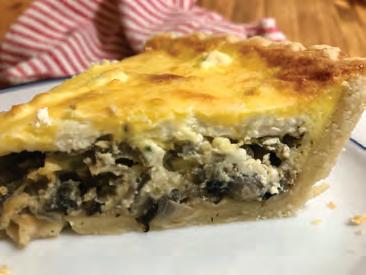
 By Jessica Grann | Special to the Chronicle
By Jessica Grann | Special to the Chronicle


Itypically serve quiche for brunch, although my family will happily eat it at any meal.
This is a really nice recipe to whip up using simple, savory ingredients. I love the combination of goat cheese with onions and mushrooms and cook with them often.
I used a prebought store crust for this recipe as I adore short cuts. “Mostly homemade” is homemade to me. Anything I can do to make cooking easier for both myself and my readers is a bonus.
If you would like to use your own pastry, simply prepare one pie crust in a pie plate. The egg and cream mixture bakes up fluffy and soft and is simply a pleasure to eat.
Ingredients:

1 large onion, finely chopped
12 ounces of white mushrooms, washed and sliced
3 tablespoons unsalted butter, divided 4 large eggs, room temperature
½ cup heavy cream
½ cup whole milk
1 teaspoon sea salt
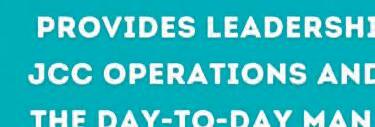

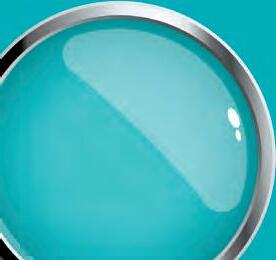
¼ teaspoon black pepper




4 ounces of goat cheese
¼ cup grated Parmesan cheese, divided Set the eggs on the counter an hour before

you begin to prepare the quiche; remove the frozen pie crust from the freezer, and allow it to defrost for about half an hour. The bottom crust will cook better if you don’t put freezing-cold pastry straight into the oven.
Chop the onions and wash and slice the mushrooms. You can use fancier mushrooms if you please, but I advise against using portobello mushrooms because they are too meaty for this recipe.
Set your oven temperature to 375 F, and place your oven rack in the middle of the oven.
Melt 2 tablespoons of the butter over medium heat, and add the diced onions. Sauté for 10-15 minutes, stirring every few minutes. When the onions start to look translucent, add the last tablespoon of butter and the mushrooms. Stir it well to be sure that the mushrooms are evenly coated in butter, and sauté for another 10 minutes until they are soft and cooked through. The mushrooms and onions will
reduce quite a bit as they are cooking. Add the salt and pepper to the pan, and mix well before turning the mixture into the pie plate, spreading it evenly across the bottom of the pie crust.
In a medium-sized bowl, whisk the eggs for a few minutes by hand until they have some nice frothy bubbles across the top.
Add in 2 tablespoons of the Parmesan cheese with the milk and heavy cream, whisking until nicely combined. Don’t use low-fat dairy replacements — you’ll be sacrificing the desired flavor and texture for what is just a slight caloric difference.
Cut up about 4 ounces of goat cheese and place the pieces atop of the mushroom mixture. I usually buy a 10-ounce package of goat cheese and use the rest at another meal. Goat cheese can come in random sizes like 3-ounce, 4-ounce or 6-ounce packages. If the package available for you is 3-ounce,
just use that — don’t feel the need to purchase a second package for an extra ounce of cheese.
Gently pour the egg mixture evenly over the mushroom mixture until the egg mixture hits the lowest part of the fluted crust. Sprinkle with the remaining 2 tablespoons of Parmesan cheese, which will create a firmer “crust” across the top during baking. Don’t overfill the pie plate. I find that store-bought crusts hold a little less than a homemade crust, for which you can create more depth by bringing the fluted crust up higher in the pan.
This recipe makes enough filling for a deeper quiche. You may have about half-cup of egg mixture left if you’re using a store-bought crust. When that happens to me, I just put the excess into a buttered ramekin and make a little souffle snack.
Place a baking sheet under the quiche to avoid a messy oven in case of leaks.
Bake for 35 minutes at 375 F, then reduce the oven temperature to 350 F and continue to bake for an additional 10 minutes or until the top starts to turn golden brown.
Remove from the oven and allow to cool for 15 minutes before serving warm.
This recipe tastes great at room temperature, so it’s a really nice addition for a brunch or Shabbat lunch meal if you wish to make it ahead.
Enjoy and bless your hands! PJC

16 DECEMBER 23, 2022 PITTSBURGH JEWISH CHRONICLE PITTSBURGHJEWISHCHRONICLE.ORG Life & Culture
— FOOD — p Mushroom and goat cheese quiche
Jessica Grann is a home chef living in Pittsburgh.
bachelor'sormore advanceddegree provenstrategic leadership financialmanagement experience SEETHEFULLJOBDESCRIPTION ANDREQUIREMENTSAT SHAWJCC.ORG/CAREERS Theshawjccof akronis hiringfor: demonstratedprogram developmentcompetencies bachelor'sormore advanceddegree provenstrategic leadership financialmanagement experience SEETHEFULLJOBDESCRIPTION ANDREQUIREMENTSAT SHAWJCC.ORG/CAREERS Theshawjccof akronis hiringfor: demonstratedprogram developmentcompetencies bachelor'sormore advanceddegree provenstrategic leadership financialmanagement experience SEETHEFULLJOBDESCRIPTION ANDREQUIREMENTSAT SHAWJCC.ORG/CAREERS Theshawjccof akronis hiringfor: demonstratedprogram developmentcompetencies Michael H. Marks, Esq. michael@marks-law.com member, national academy of elder law attorneys Working with Marks Elder Law Marks Elder Law when planning for your family’s future can help you make better decisionskeeping more of your money during your lifetime We help families understand the strategies strategies, the benefits benefits, and the risks involved with elder law, disability law and estate planning. Crafting strategies that allow you to keep more of your assets during your lifetime; Exploring the many payment options for disability and longterm care services; Designing instruments that protect your assets from Medicaid spend-down requirements; Ensuring that your affairs will be handled the way you want if you experience a serious injury or illness; and Administering your estate to ensure proper distribution of your assets while minimizing any taxes owed. SAFEGUARDING YOUR PRESENT & FUTURE www.marks-law.com 412-421-8944 michael@marks-law.com 4231 Murray Avenue Pittsburgh, PA 15217
Photos by Jessica Grann
A symbol endures: Public menorah lightings withstand controversy, antisemitism
represent the winter holiday season and had adopted a more secular meaning in the social milieu.
By Sasha Rogelberg | Contributing Writer
The crowd for this year’s National Menorah lighting in Washington, D.C., was expected to exceed 4,000 guests. That was the estimate of Rabbi Levi Shemtov, executive vice president of American Friends of Lubavitch (Chabad), the group that has lit the menorah and put it on display near the White House annually since 1979. In its first year, the White House Chanukah candelabra was a humble 4 feet tall; today, it’s about 30 feet. And just as the menorah has grown in size, so, too, have the crowds to see the spectacle. Shemtov expected this year’s turnout to surpass the pre-COVID crowds.
This year, he adds, the menorah-lighting on Sunday, Dec. 18 — the first night of the eight-day holiday — is especially important. In a climate of increasing antisemitism, the menorah represents defiance against hate, as it did 2,000 years ago when the Maccabees overthrew their Greek-Syrian oppressors, the sustained light of the menorah representing Jewish resistance.
“The central message of Chanukah is that light will always prevail over darkness, no matter how dark it seems,” says Shemtov. “And this story hasn’t changed in millennia.”
For thousands of years, the menorah has been a symbol of Chanukah’s message of resilience and Jewish pride, but its presence in America’s public sphere has only emerged relatively recently — for the past 48 years, in which time it endured a Supreme Court case, dissent within the Jewish community, a pandemic and a rising tide of antisemitism.
However, year after year — though not without controversy — it still emerges as a motif of both Jewish grit and joy.
Before Levi Shemtov became the steward of the National Menorah lighting, the torch was held by his father, Rabbi Abraham (Avrohom) Shemtov.
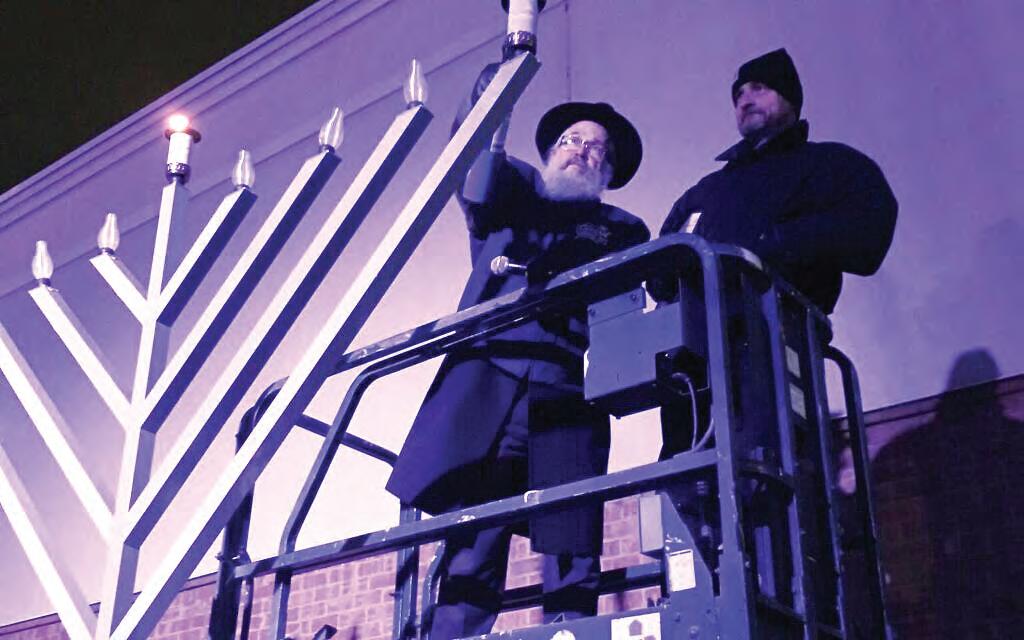
In December 1974, the elder Shemtov, regional director of the Philadelphia Lubavitcher Center, organized the nation’s first public lighting in Philadelphia in front of Independence Hall. The menorah itself was small — white and made of wood — not even coming up to the collar bones of the rabbi and four yeshiva students accompanying him.
Though the celebration was understated, it was a snapshot of American culture, Jewish and not. It came two decades after the Rebbe — Rabbi Menachem Mendel Schneerson — took over the leadership of the Chabad-Lubavitch movement in 1951, when he began transforming Chabad from an insular group to a widespread Jewish philosophy, according to Maya Balakirsky Katz, assistant professor of Jewish art at Bar-Ilan University in Israel and author of “The Visual Culture of Chabad.”
‘Just
wake them up”
In the years following the Holocaust, the Rebbe wanted to instill deep Jewish pride and rejuvenate American Jews from assimilation that could diminish Jewish identity.
“Their intrinsic value was to go wherever you need to go to find any last Jew: Just wake them up, not religiously, but to their culture, to their selfhood and to their nationhood as Jews,” Katz says of what is now the well-known Chabad modus operandi.
In the early 1960s, President John F. Kennedy created the Peace Corps., designed to send young American volunteers overseas to advance U.S. ideals such as democracy. Schneerson, says Katz, employed a similar strategy, sending Jewish emissaries (shluchim), throughout the country and the world to boost Jewish life and education.
Publicizing the miracle
Prior to that, Jewish rituals and celebrations were relatively private affairs.
“Public Chanukah menorah-lighting was not considered something we do. Like, you do it in your home; be modest, a man in the street,” Katz says of the Jewish thought at the time. “He was like, ‘You’re mixing it all up; [be a] Jew in the street, be a man at home.’”
The 1974 menorah-lighting in Philadelphia — and a 1975 lighting by Chabad Rabbi Chaim Drizin of the Bill Graham Menorah at Union Square in San Francisco, a monumental 25-foot-tall structure — followed Schneerson’s 1973 campaign to deliver mass-produced tin menorahs to Jews, encouraging them to light candles.
Shemtov saw the menorah as a symbol that occupied a liminal space between public and private, sitting near the window of a home where it spread warmth inside,
while visible to viewers outside. A public lighting of the menorah still occupied this similar space, he argued. Far from just publicity, the public lighting extended the spiritual message of Chanukah and fulfilled the mitzvah of pirsum hanes , the “publicizing” or “proclamation” of the miracle of the day’s worth of oil that lasted for eight in the traditional story of Chanukah.
“This started the whole activity, the effort and activity, which now is spread through the world; the celebration, the marking of Chanukah, is shared with the world outside,” he says.
But not all Jews welcomed the public menorah lightings. In the late 1970s, leaders from the Reform movement wrote to the Rebbe, objecting to the public lighting.
“Pushing this symbol in public spaces has far greater implications for the Jewish community than just Chanukah,” says Gratz College president Zev Eleff.
Some Jewish leaders were concerned that the public display of a menorah was a violation of the separation of church and state. Jews were particularly sensitive to this issue, he says, because “where the church operates as government, Jews do not always fare that well.”
The debate over the menorah’s role in church-state separation culminated in the 1989 Supreme Court case County of Allegheny v. American Civil Liberties Union, in which the court considered the constitutionality of the presence of a public nativity scene at the Allegheny County Courthouse in Pittsburgh and an 18-foot-tall menorah outside the City-County Building.
The court found that the nativity scene violated the Establishment Clause of the First Amendment, as it depicted content that was explicitly religious, while the menorah, like a Christmas tree, was a symbol of a holiday that had come to
The image of Chabad rabbis lighting a menorah in front of a crowd has since become iconic, with President Jimmy Carter, followed by Presidents Ronald Reagan, George H.W. Bush, Bill Clinton, George W. Bush, Barack Obama, Donald Trump and Joe Biden taking part in a ceremonial lighting, beginning in 1979. Embroiled in managing the early days of the Iranian hostage crisis, Carter made a rare emergence from the White House to light the menorah’s shamash (or “helper” candle) on the White House lawn.
‘More critical than ever”
Though the practice of public menorahlighting has grown over the years, Katz suggests that the significance of the menorah itself as a public symbol has diminished. Its presence in media, popular culture and the public eye has eroded some of its original religious substance, she believes.
While lightings may not hold the same controversy or social gravity as they did in the 1970s and ’80s, Chabad leaders of today argue that the presence of these public events are necessary in the face of both continued assimilation and growing antisemitism.
“It’s very important not to pull back because of it. We hold our ground and be bold, not to demonstrate fear,” says Rabbi Shmuel Kaplan of the Lubavitch Center in Baltimore.
But as much as rabbis are aware of the importance of Jewish visibility in the face of antisemitic intimidation, the purpose of public menorah-lightings still harkens back to their original goals.
“It’s more critical in this country than ever before,” emphasizes Kaplan. “Not because there’s coercion — we don’t have the coercion anymore — but because of the lack of identification. We have a serious problem with Jewish identity.”
While visible Jewishness can speak back against antisemitism, a “robust semitism” is how to truly combat antisemitism, says Levi Shemtov.
The lighting of the menorah, as a symbol for Chanukah and an age-old tale of Jewish pride in the face of bigotry and oppression has remained relevant for Jews for thousands of years and in the public eye for the past half-century. The ritual might just offer some insight on how the next generation can find unwavering Jewish identity.
“It may not be a panacea,” acknowledges Shemtov. “But it’s definitely a trigger and a good start for a very positive [holiday] experience.” PJC
Sasha Rogelberg writes for the Jewish Exponent, an affiliated publication where this first appeared.
PITTSBURGHJEWISHCHRONICLE.ORG PITTSBURGH JEWISH CHRONICLE DECEMBER 23, 2022 17 Life & Culture
— NATIONAL —
p Pittsburgh’s Rabbi Yisroel Rosenfeld lights the menorah at 2020’s Chanukah celebration at the Waterfront.
Photo provided by Rabbi Yisroel Altein
Michael and Cait Ulicny announce the birth of their daughter, Capri Rose, born on Oct. 29, 2022. Proud big brother, Michael Ulicny, a student at the Beth Shalom Early Learning Center. Maternal grandparents are Lynn Lawrence and Kurt Eltringham and David Thayer, all of Greensburg. Maternal great-grandparents are Joan and Herschel Benjamin and Diana Thayer, all of Greensburg. Paternal grandparents are Michael and Kathy (Kramer) Ulicny of Pittsburgh. Paternal great-grandparents are the late Bernard and Renee Kramer and Richard and BettyAnn Ulicny.

Seeing Chanukah candles in a new light
The idea of light plays a prominent role in Jewish thought. The first of the 10 “sayings” that G-d used to create the world was, “Let there be light!” According to the midrash, that light lasted 36 hours. Afterward, it was hidden for the future. Interestingly, over the course of Chanukah, Jews kindle 36 candles. (The first night, one candle is lit; the second night, two candles are lit, etc.) These candles recall the miracle of the menorah that glowed in the Holy Temple.
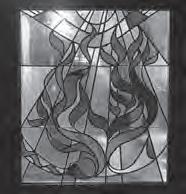
of Shabbos candles. But they are not. The Rambam (Maimonides) rules that if one only has enough money (or enough candles) to perform one mitzvah, then lighting Shabbos candles takes priority over kindling the lamp of Chanukah! That seems like the ultimate contradiction, especially in view of the rule that one can use tallow (fats) for Shabbos, even though the light from tallow is dim and smoky. Yet for the Chanukah menorah to be truly kosher, the light must be pure and clean.
Nevertheless, the Rambam declares that if a person can only perform one mitzvah, he/she should obtain and light Shabbos candles. To stress the point, he places this
Molly and Peter Blasier of Point Breeze celebrated the ketuba-signing of their daughter, Louisa Eve, to Chad Dylan Stark. Chad is the son of Candice and Steven Stark of New York, New York. Both graduated with business degrees, Louisa from Tulane University and Chad from the University of Michigan. Louisa works in the beauty industry and Chad as third-generation CEO of his family’s textile company, Stark Carpet. Now living in Los Angeles, Louisa and Chad met in New York City through a dear mutual friend who will be marrying them under the chuppah, February 2023, in Cabo San Lucas, Mexico. PJC
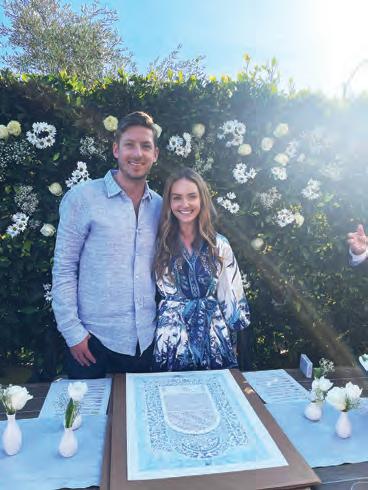
The Code of Jewish Law says that lighting candles on Friday night brings peace into the home. In a practical sense, they eliminate dark areas so that people won’t fall. They also add an aura of serenity to Shabbos.
What is the relationship between the 36 candles of Chanukah and the light of creation that lasted 36 hours?
Yet another light plays a significant role in Jewish life — Shabbos candles. The Code of Jewish Law says that lighting candles on Friday night brings peace into the home. In a practical sense, they eliminate dark areas so that people won’t fall. They also add an aura of serenity to Shabbos.
There are several differences between the mitzvot of Shabbos candles and the menorah. For instance, Shabbos candles are lit before sunset while Chanukah candles are lit after dark. Shabbos candles are lit to illuminate the interior of the house. Ideally, Chanukah candles are lit at the door or window to brighten the space outside.
These differences reflect the purpose of each mitzvah. Shabbos candles have a practical function — they make the home safe. They can also be used for studying or other permitted tasks. By comparison, Chanukah candles can’t be used for reading or to serve any other function. They testify to the light (i.e., presence) of G-d that exists, especially during the time of spiritual darkness. This explains the connection between the 36 hours of the initial light of creation and the 36 Chanukah candles. Both reflect G-d’s infinite presence in this finite world.
With that in mind, Chanukah lights might appear to be superior to the light
rule in the section on Chanukah and not in the section on Shabbos in his book, the “Mishneh Torah.”
There are several possible explanations. There is a concept in Jewish law that that a more frequently practiced mitzvah takes precedence. Therefore, one could argue that Shabbos candles deserve priority.
Yet there is a deeper level.
Earlier, we noted that lighting Shabbos candles serves to bring peace into the home. Peace occurs when opposing issues become resolved so that the opposition no longer exists. For example, spirituality is viewed as beyond nature. The Hebrew word for “holy” is kadosh, which means being separate or apart from the mundane. Lighting Shabbos candles eliminates the potential obstacles found in the material world, allowing the spirit of Shabbos to permeate the atmosphere in the home.
Chanukah candles, by contrast, are intrinsically holy. They only exist to reveal G-dliness. For the same reason, they will continue to be lit even in the days of the Messiah!
A Good Shabbos and Freilichin Chanukah. PJC
Rabbi Yossi Rosenblum is CEO of Yeshiva Schools of Pittsburgh and rabbi of Congregation Kesser Torah. This column is a service of the Vaad Harabanim of Greater Pittsburgh.
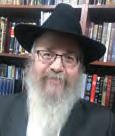
18 DECEMBER 23, 2022 PITTSBURGH JEWISH CHRONICLE PITTSBURGHJEWISHCHRONICLE.ORG Torah Celebrations
Rabbi Yossi Rosenblum Parshat Miketz Genesis 41:1 - 44:17
Business & Professional Directory Hello, my name is Lynn Irvin, I’m interested in cleaning houses and apartments. I have excellent references and many years of cleaning experience. • Reliable, honest, and trustworthy • Very professional in my duties Housecleaning Service I can be reached at 412-999-1628 (cell) or 412-241-0711 (home) HOUSECLEANER Get the news. THEN GET THE FULL STORY ❀ In the Pittsburgh Jewish Chronicle For home delivery, call 410.902.2300, ext. 1 Births
www.newlightcongregation.org 412-421-1017 750 Soose Road (near Wibble Run Road) Shaler Twp, PA 15209 NEW LIGHT MEMORIAL CHAPEL OPEN TO THE PUBLIC Mondays & Fridays in December The New Light Memorial Chapel is dedicated to the lives lost on October 27, 2018 NO APPOINTMENT NECESSARY MONDAYs: December 5, 12, 19, 26 10:00 AM - 2:00 PM FRIDAYs: December 9, 16, 23, 30 10:00 AM - 3:00 PM Ben and Betsy Samson are thrilled to announce the birth of twins,
born on the
doing well. The
Engagement
Micah Isaac Samson and
morning of Dec. 5. Betsy and the babies are healthy and
grandparents include Philip and Iris Samson, Mimsie Leyton and Tom Smith.
Obituaries
MARKOVITZ: Retired United States Bankruptcy Judge Bernard (Bernie) Markovitz passed away on Saturday, Dec. 17, 2022, at age 83. Born to Cecilia and David Markovitz in Pittsburgh, Bernie is survived by his wife, Anne, daughter Susan, son William, daughter-in-law Cathy, and grandchildren Ella, Jana, Zachary and Koa. Judge Markovitz graduated from Taylor Allderdice High School in Squirrel Hill. With limited means but a fierce determination, Bernie continued his education at Westminster College and earned his Juris Doctor from Duquesne University School of Law. Before being sworn in to the Western District of Pennsylvania’s sixth bankruptcy judge on Nov. 25, 1985, Bernie’s notable career achievements included lieutenant commander in the United States Navy Judge Advocate General’s Corps, assistant district attorney, assistant solicitor for the City of Pittsburgh Schools, and a successful private practice for nearly 20 years. While he presided over thousands of bankruptcy cases during his tenure, the most visible was the Pittsburgh Penguins. During this case, Judge Markovitz barred the team’s relocation writing: “The Penguins are as much a part of the warf and woof of this community as are its other professional sports teams, museums, parks, theaters, and ethnic neighborhoods.” Bernie loved his family and friends with this same fierceness. While at Westminster College, Bernie met Anne Catherine (Cathy) Dalae. They married in 1966 and made Pittsburgh their home for almost 50 years before moving to Florida, the “Sunshine State.” A funeral service was held Thursday, Dec. 22, 2022, at Hodges-Kiser Funeral Home in Fort Myers, Florida. In lieu of flowers or similar, the family asks that a donation be made to a charity of your choice in Bernie’s name.
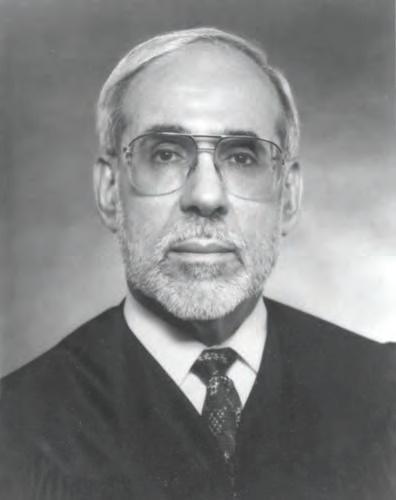
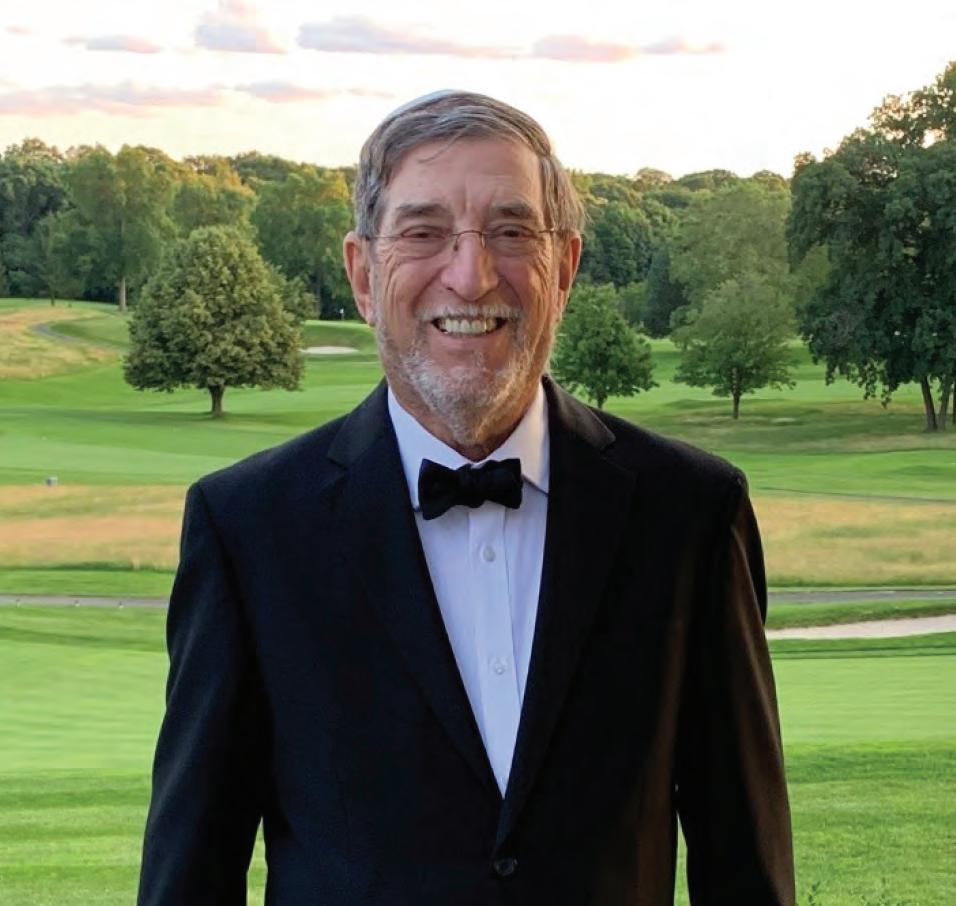
SCHNEIDER: Faye Schneider, on Monday, Dec. 12, 2022. Beloved wife of late Robert Schneider. Beloved mother of William Schneider. Sister of late Ethel Mandel, late Rose Krasnopoler, late Milton Rubin and late Abe Rubin. Sister-in-law of late Irving Krasnopoler, late Alice Rubin and the late Martin Mandel. Also one grandchild, Kathleen Blalock. Also survived by Jeffrey Mandel, Dena Krasnopoler, Mitchell Krasnopoler, Bonita Krasnopoler, Aron Krasnopoler, Goldyn Rubin, Kenneth Rubin and Melissa Rubin. Services were held at Ralph Schugar Chapel, Inc. Interment New Light Cemetery. Contributions may be made to New Light Congregation, 5915 Beacon Street, Pittsburgh, PA 15217. schugar.com
Robert (aka Bob, Bobby) Seiden passed away surrounded by love on Saturday, Dec. 10, at the age of 82. Bob was born on May 1, 1940, in Brooklyn New York, to Fannie and Benjamin Seiden. Bob graduated from Samuel J. Tilden High School before serving as an Army Ranger in Vietnam. After returning from his service, he began his career in the sheet metal industry, eventually moving to Pittsburgh to become the president of SSM Industries, where he retired in 2006. In his retirement, Bob moved to Myrtle Beach where he started a small business, Bob’s Handyman Services, and played a lot of golf. It was in Myrtle Beach where he met his wife, Peggy Crawford Bowers, to whom he has been married for 12 years. He was a lifelong fan of the Brooklyn Dodgers — as well as any team one of his grandchildren played for. He was also known by any of his golf partners for making up his own rules of the game! Bob had a long history of caring for others, starting when he was young, and served as a camp counselor for children with cerebral palsy and continuing through his dedication and care of the love of his life, Irene, as she battled early onset dementia. Preceded in death by his brother, Daniel Seiden, his sister and brother-in-law, Harriet Seiden Brotter and Marvin Brotter, and his beloved wife of 39 years, Irene Kozichousky Seiden. Bob is survived by his children, Karen and Lee Levitt, Brad Seiden, Rachel and Ed Fagan, and his grandchildren, Maddie (Reece), Kyle, Sammie, Marla, Sophie and Noah, in addition to his bonus grandchildren, Trish, Connor and Nick. He is also survived by his best friend and adventurer, Jerry Greenberg. Bob had no “in-laws,” he considered all of them “just family.” He was the original “funcle” always good for a prank or a tickle. He will be greatly missed by his many nieces and nephews and their children. The family wishes to extend a special thank you to his caregivers at NHC Health Care who took wonderful care of him throughout the last few months and Caris Hospice, who took gentle care of him though his last few days. Burial was handled by Star of David Memorial Chapel in West Babylon, New York. jewish-funeral-home.com/robert-seiden/. He was laid to rest at Wellwood Cemetery where he will dance once again with Irene. Donations in his memory can be made through Caris Hospice to one of many organizations that Bob supported: carishealthcare.com/donations/.
Anonymous
Norman & Sylvia Elias
Gertrude Elias
Norman & Sylvia Elias Joseph Elias
Lynne & Jim Gabriel
Rhoda & Jay Gefsky
Milton Shermer
Mollie Barnett
Jerry Gordon Esther Eisman
Jean Horne Sheldon A Cohen
Cheryl Kalson Bella Kalson
Amy R Kamin Celia Kaddell
JoAnne Kravetz
Norris Lipman
Janice Mankin
Albert Marcus
Ella Farber Lipman
Mamie Levine
Janice Mankin Mark Levine
Arlene Murphy Dr William Ratowsky
The Love and Rutman Families Charlotte Love
Selma P Ryave Sol E Podolsky
Andrea J . Sattler Helyn Spokane
Edris C Weis
Harry Tannenbaum
Harold C Weiss Mollie B Weiss
THIS WEEK’S YAHRZEITS —
Sunday December 25: Milton Backal, Baruch Berenstein, Bert Bergad, Sydney Bertenthal, Fredric Alvin Green, Samuel M Hyman, Minnie Van Praagh Jacobs,Philip Katz, Joseph Levy, Ella Markowitz, Louis Miller, Gust H Oppenheim, Ralph Pecarsky, Sol E Podolsky, Abraham W Shapiro, Rae Specter, William B Waldman, Bernard H Weiss, Ann Whiser
Monday December 26: Harry I Alpern, Isadore Caplan, Samuel Davis, Samuel Finkel, Louis Gallet, George J Golden, Joseph Goldhamer, Celia Kaddell, Charles Kanselbaum, Lina Kapner, Phillip Larry Katz, Louis Kessler, Sarah E Kramer, Blanche Levine, Louis Monsein, Jacob Robinson, Shirley B Samuels, Sarah Stein, Albert Zweig
Tuesday December 27: Pearl Alinikoff, Ethel Berry, Beyne R Bricklin, Ida Briskin, Sheldon A Cohen, Thomas Cohen, Abe Darling, Charles Finesod, John J Fischer, Morris R Gordon, William L Kann, Arnold Kanselbaum, Gertrude C Kimball, William Krapin, Samuel Fishel Londo, Sgt Max Marcus, Mollie Rubin Pretter, Joseph Recht, Harry Rice, Charlotte June Ruthrauff, Erma R Spielberger
Wednesday December 28: Edna Sarah Bennett, Max L Berg, Moses Bluestone, Paul Cooper, Sadie Mermelstein Feinberg, Celia Garber, Henrietta Goldman, Phillip Goodman, Nathan Greenberg, Rose B Gross, Ethel Farber Hoyt, Yetta Klein, Dr Marvin Kurfeerst, Celia Levin, Racille Light, Ruben Marcus, Samuel Neustein, Belle Mandell Rodin, Ruth Sachs, Bessie Sands, Abraham Schulman, Julius Shapiro, Louis Shapiro, Raymond Weinberg, Bella Zeman
Thursday December 29: Anna Arnowitz, Freda Blumenfeld, Dora Cole, Anna Sanes Cukerbaum, Esther Davis, Caroline Falk, Theodore Gold, Abe Goldstein, Josephine Levine Gottlieb, Ada Hilsenrath, Anna Hinkes, Harry Kellman, Harry Klatman, Josiah Drotman Lazar, Harry Levinson, Samuel Mandelblatt, Abe Mullen, Sadie Segal, Jennie Shaffer, Tillie Simon, Louis B Supowitz, William Zeidenstein
Friday December 30: Berul Amstey, Fannie Berner, Florence G Davidson, Joseph Goldhammer, Ethel J Greenberg, Helene Tumpson Horewitz, Albert Marcus, David Miller, Edwin L Miller, Fannie Pecarsky, Fannie Robinson, Maida Rothaus, Esther Levy Shapiro, Meyer M Snyder, Matthew Teplitz, Ida Sack Tobias, David Weinberger, Morris Wolf
Saturday December 31: Bess B Aberman, Abraham Boodman, Henry E Green, Esther Ruth Karpo, David Labowitz, Reuben B Lando, Charlotte Love, Anna Miller, Laura Roth Miller, Jerome Myers, Samuel Roth, Samuel Shaffer, Edward H Talenfeld
THANK YOU
One of the greatest mitzvot we can perform is helping to preserve the memories of our loved ones in the community who have passed, because those benefitting from our efforts cannot thank us.
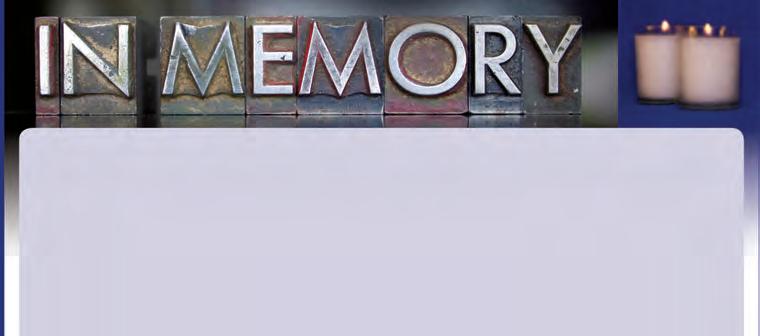
The Jewish Cemetery & Burial Association of Greater Pittsburgh offers its sincerest thank you to each of you who have made contributions of time, energy, and financial support.
Your kindnesses and generosity allow the JCBA to continue our efforts to preserve Jewish cemeteries and provide dignified burials to Jews in need in accordance with our laws and customs.

PITTSBURGHJEWISHCHRONICLE.ORG PITTSBURGH JEWISH CHRONICLE DECEMBER 23, 2022 19
Jewish Association on Aging gratefully acknowledges contributions from the following: A gift from ... In memory of...
Anonymous Caroline Falk Anonymous
Cele & Jacob Feingold
Anonymous Bernice Finegold Anonymous Arnold Kanselbaum
Anonymous David Racusin
Anonymous Thelma Newman Racusin
David Miller
Contact the Development department at 412.586.3264 or development@jaapgh.org for more information.
is made
by a
For more information about JCBA cemeteries, to volunteer, to purchase plots, to read our complete histories and/or to make a contribution, please visit our website at www.JCBApgh.org, email us at jcbapgh@gmail.com, or call the JCBA office at 412-553-6469
JCBA’s expanded vision
possible
generous grant from the Jewish Federation of Greater Pittsburgh’s Jewish Community Foundation
www.pittsburghjewishchronicle.org Please see Obituaries, page 20
Obituaries






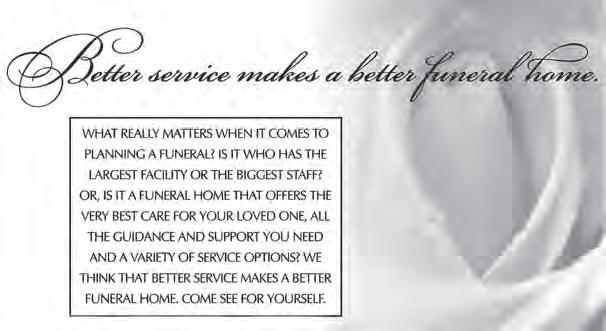
Obituaries:




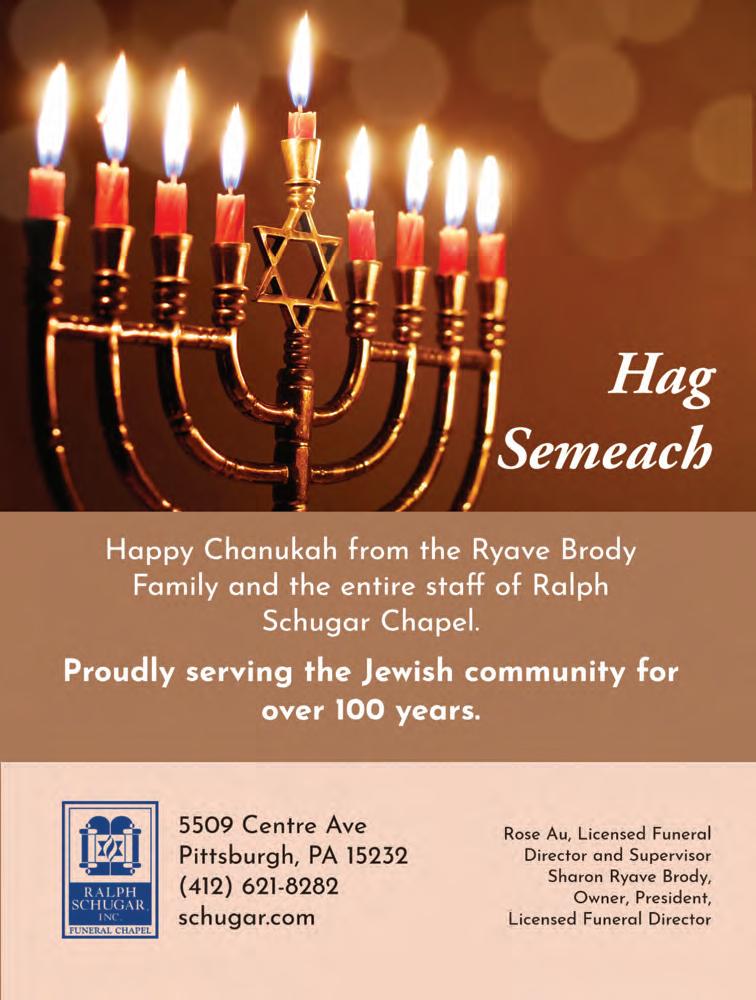









SENDER: Rebecca Elizabeth Sender (née Lubove) 1964 – 2022. With great sadness we announce the untimely passing of our beloved mother, sister, aunt, daughter and loyal friend Rebecca Elizabeth Sender (née Lubove), following a courageous battle with cancer. She died peacefully surrounded by family and friends on Saturday, Dec. 10, 2022. Though Rebecca’s time with us was short, she packed a lot of living, love and generosity into her life, and was especially proud of her children, Jessica Rory Sender and Matthew Daniel Sender. After her children, her greatest passions were travel, skiing, art, cats and her lake house, where family and friends — and friends of friends and family — were always welcome. “Becky” was born on Oct. 9, 1964, in Pittsburgh, where her father, Roy Lubove, was a professor, historian and prolific author at the University of Pittsburgh; her mother, Carole Klein (née Gollance), was a renowned fiber artist; and her adopted father, Stanley Klein, is a photographer. Inheriting her mother’s appreciation of art, Becky studied for a career in art and museum administration, earning her undergraduate degree in 1985 from Wesleyan University (where she played goalie on the women’s hockey team), followed by an M.B.A. from the Katz Graduate School of Business at the University of Pittsburgh in 1992, and an M.A. in art history and archaeology from Columbia University in 1999. Becky had a rich and rewarding career in arts administration. She worked for several prominent organizations, including the American Federation of Arts in New York where she served as chief development officer, WNET-TV/Thirteen Public Television in New York, Pittsburgh Center for the Ar ts, Carnegie Institute and Carnegie Library, and the Brooklyn Museum. In 2001 she was appointed as associate director of the Princeton University Art Museum, eventually becoming acting director from January 2008 to June 2010. She was appointed deputy director for finance and administration for The Yale Center for British Art in 2011, where she managed the operating budget for the Center for British Art, and oversaw the institution’s security, facilities and operations, human resources, information technology and museum shop. She also managed the institution’s emergency plan and worked with the center’s partner institution, the Paul Mellon Centre for Studies in British Art in London. She later became a shipping and logistics entrepreneur, founding the company Sender Express LLC, which survives her. Becky loved travel, scuba diving and skiing, often combining her passions in adventurous places, including Zermatt, Switzerland; Chamonix, France; Whistler Blackcomb in Canada; and, as recently as this past August, the Cerro Catedral ski resort near Bariloche, Argentina. Off the mountain, closer to sea level, she hiked the Appalachian Trail, visited the Maldives in the Indian Ocean, Mexico, and, just a few months ago, Alaska and London. Showing resilience and courage in the face of her debilitating disease, Becky always maintained a positive attitude and sense of adventure until she could no longer endure the travel. But before that, she attended daughter Jessica’s graduation from Tulane University in New Orleans last May, and saw son Matthew’s ascension as a junior this year at the University of Pennsylvania. In addition to her children, whose accomplishments brought her endless pride, she is survived by her brother Seth Lubove and his wife Donna Sanford in Los Angeles, along with their children she loved and spoiled as if they were her own, Jesse Sanford Lubove of Cocoa Beach, Florida, and Emma Anne Lubove of Charlotte, North Carolina; and adopted father, Stanley Klein, in Pittsburgh, stepbrother Scott Klein and stepsister Mindy Klein. Her dear friends Bob Schneck and Liz Boyce were a constant by her bedside, along with Lorretta and Gina Brown, the master cookie artist who became her business partner. Not to be forgotten are her loyal ragdoll cats, Jackson and Charlie, and their many furry predecessors. She was predeceased by her mother, Carole, and father, Roy. In lieu of flowers, the family has asked for memorial donations to be made to the Bucks County SPCA to support animals in shelter, at P.O. Box 277, Lahaska, PA 18731 or buckscountyspca.org/donate/, or to the National Sports Center for the Disabled at 1801 Mile High Stadium Circle, Suite 1500, Denver, CO 80204 or https://nscd.org/honorary-and-memorial-gifts/. Send condolences to varcoethomasfuneralhome.com. PJC

20 DECEMBER 23, 2022 PITTSBURGH JEWISH CHRONICLE PITTSBURGHJEWISHCHRONICLE.ORG
D’Alessandro Funeral Home and Crematory Ltd. “Always A Higher Standard” Dustin A. D’Alessandro, Supervisor • Daniel T. D’Alessandro, Funeral Director 4522 Butler St. • Pittsburgh, PA 15201 (412) 682-6500 • www.dalessandroltd.com
Continued from page 19 LOCALLY OWNED and OPERATED 1650 GREENTREE ROAD • PITTSBURGH, PA 15220 412.563.2800 • FAX 412.563.5347 SERVING Scott Twp., Greentree, Carnegie, Mt. Lebanon, Upper St. Clair and Bethel Park D EBORAH S. P RISE Licensed Jewish Funeral Director • Serving the Pittsburgh Jewish Community with Traditional Jewish funerals • Specially Developed Taharah Room with Mikva facilities for Chevra Kadisha • Accommodations for Shomer • Guaranteed advanced funeral planning NEWEST FUNERAL HOME News for people who know we don’t mean spiced tea.
Friday in the and all the time online
home delivery,
Chai
Every
@pittsburghjewishchronicle.org. For
call 410.902.2300, ext. 1.
inlays.





















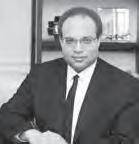








SHADYSIDE • $695,000



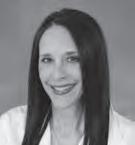



North Woodland Rd. Townhome. Unique custom built sophisticated 4 levels. Lower Level has a great wine cellar, storage, int garage, and a side room which could be an office. First floor has a great room kitchen, dining and living area, plus 1/2 bath. This room leads to an unbelievable courtyard and luscious grounds with a sprinkler system. Next level- large room with a whimsical full bath. Top level has a great master area, with master bath and laundry, Smashing steel and glass staircase, dramatic lighting. Terrific acrhitectural details.

PITTSBURGHJEWISHCHRONICLE.ORG PITTSBURGH JEWISH CHRONICLE DECEMBER 23, 2022 21 JILL and MARK PORTLAND RE/MAX REALTY BROKERS 412.521.1000 EXT. 200 412.496.5600 JILL | 412.480.3110 MARK FOR SALE
- $635,000 - MOTIVATED SELLERS
garage parking equipped
outlet.
transportation, the Universities, Hospitals,
corridors, restaurants
MELISSAREICH,REALTOR 412-231-1000OFFICE 412-215-8056MOBILE RUBINOFFREALTY.COM LETUSBEYOURGUIDE LETUSBEYOURGUIDE Isanewhomeonyourholidaywishlist? RUBINOFFREALTY Real Estate REALTOR SERVICES FOR SALE Contact me today to discuss all of your real estate needs! Sherri Mayer, Realtor Squirrel Hill Office C: 412-760-0412 O: 412-421-9121x225 sherrimayer@howardhanna.com HowardHanna.com Smith-Rosenthal Team Jason A. Smith & Caryn Rosenthal Jason: 412-969-2930 | Caryn: 412-389-1695 Jasonasmith@howardhanna.com Carynrosenthal@howardhanna.com Are You Buying or Selling a Home? Let Us Guide You Through the Process! CALL THE SMITH-ROSENTHAL TEAM TODAY. 5501 Baum Blvd. Pittsburgh PA 15232 Shadyside Office | 412-361-4000 5125 Fifth Ave. 2 & 3 Bedrooms Corner of Fifth and Wilkins
square feet
in Shadyside” 412-661-4456 www.kaminrealty.kamin.com FOR RENT KEEPING IT REAL IN REAL ESTATE! Denise Serbin, Realtor HOWARD HANNA REAL ESTATE Squirrel
ice
Ave. Pittsburgh, PA 15217 412-480-6554
o ice deniseserbin@howardhanna.com Contact Denise today for the REAL facts on why NOW is the best time to buy or sell! Contact me today to find out how Howard Hanna’s exclusive buyer and seller programs can benefit you! • Buy Before You Sell • Money Back Guarantee • One Stop Shopping • Hanna Gold Advantage • Homes of Distinction • HSA Home Warranty Protection Contact Phil Durler to schedule your advertising pdurler@pittsburghjewishchronicle.org 724-713-8874 advertising@pittsburghjewishchronicle.org SHOWCASE YOUR PROPERTIES EVERY WEEK IN THE PITTSBURGH JEWISH CHRONICLE THE BEST OF THE IN YOUR EMAIL INBOX ONCE A WEEK. Sign up on the right hand side of our homepage. pittsburghjewishchronicle.org h
LAWRENCEVILLE
721 53rd Street. A stunning Lawrenceville home o ers 4 levels of luxurious finishes and unparalleled city views. The dazzling hardwood floors and an open-concept layout make living and entertaining easy. The kitchen is a chef’s paradise with stainless steel appliances, Glacier White Quartz countertops, a large island with seating, and crisp white kitchen cabinets elevated with a pop of color from the handmade backsplash tiles and mosaic
Three spacious bedrooms, 3.5 contemporary-styled baths, and thoughtful storage throughout. The top-floor bonus room features French doors to a private balcony with exceptional vistas of downtown and beyond. Enjoy the convenience of dedicated 2-car
with an EV charging
Convenient to public
High-Tech
and shopping. LERTA Tax Abatement.
Spacious 1500-2250
”Finest
Hill O
6310 Forbes
mobile/preferred 412-421-9120
Life & Culture
You won’t have a beef with this exhibit: The cow paintings of Paula Garrick Klein

 By Justin Vellucci | Special to the Chronicle
Cows.
By Justin Vellucci | Special to the Chronicle
Cows.
They once pockmarked the lush farmland in Pittsburgh’s North Hills, then disappeared — largely, that is — once suburban sprawl extended to places like O’Hara Township.
One beef cattle farm remains in O’Hara, though, and its bovine residents are the subjects of portraits by Paula Garrick Klein, who lives near the farm.
She said the decision to paint cows came naturally.
“I painted human portraits, as well — I’ve been doing that since college,” Klein told the Chronicle. “Painting someone’s portrait goes beyond the physical likeness … you’re trying to capture something about their interior lives, their internal being.”
“And I do the same thing with the cows,” she laughed.
Klein, who is Jewish, is sharing 36 of her cow-themed works — exhibits paintings, etchings and monotype prints — at Cooper-Siegel Library, 403 Fox Chapel Road, Fox Chapel, through February.

Klein’s works transcend decorative crafting with their generic images of cows and ducks, instead calling to mind painters from the international canon. There’s a good reason for that.
Klein is no amateur — a painter since nursery school and a full-time artist since the 1990s, she has exhibited paintings and monotype prints in numerous galleries in the Pittsburgh region, as well as in statewide and national juried exhibitions. Most recently, Klein — who grew up in Pittsburgh in the Highland Park neighborhood,
including Associated Artists of Pittsburgh, Pittsburgh Print Group, and Group A. She holds a Master of Arts in Teaching and a Bachelor of Fine Arts from the highly respected Rhode Island School of Design in Providence, Rhode Island.
“This area was all farms at some point,” Klein said, from her O’Hara home, which sits on formerly rural land near Dorseyville Road.
“I think I started painting the cows in 2008, 2009. That’s when the grass grew, and the cows came to graze.”
Klein admits she was taken with “this novelty”
she told the Chronicle. “I’m much more interested in how they look — they have expressions.”
Klein installed the 36 works at the Fox Chapel library around Dec. 11, she said. Can’t make the show? Check out her works at paulagarrickklein.com.
Klein, for one, doesn’t see an end to the cow paintings. She doesn’t need to — she’s doing great work and has found a niche that makes sense to her.
“Watching them is such an authentic experience,” she said. “It’s like tapping into nature.” PJC
PITTSBURGHJEWISHCHRONICLE.ORG
— ART —
Image courtesy of Paula Garrick Klein
Image courtesy of Paula Garrick Klein
“Painting someone’s portrait goes beyond the physical likeness … you’re trying to capture something about their interior lives, their internal being.”
–PAULA GARRICK KLEIN
p Fluffernutter Image courtesy of Paula Garrick Klein
Celebrating miracles
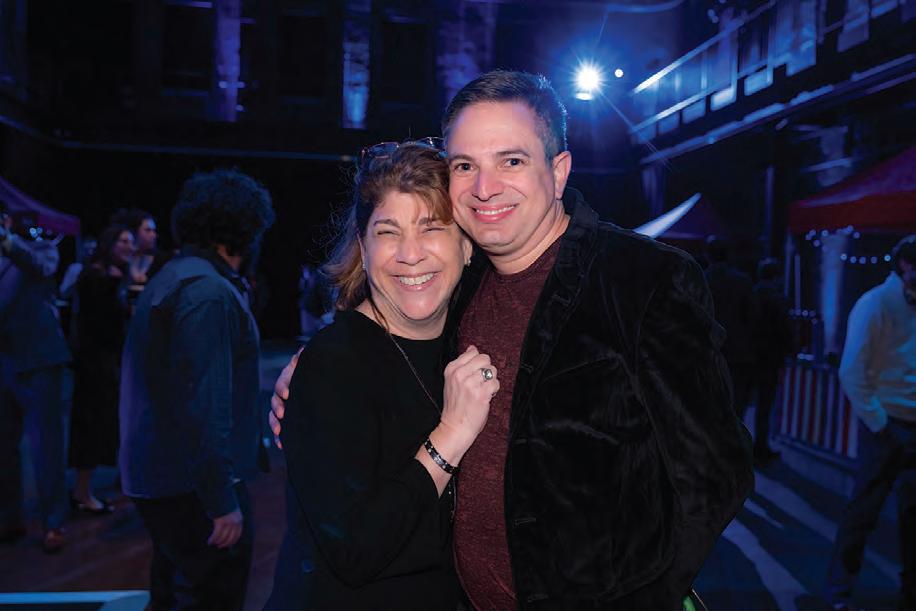
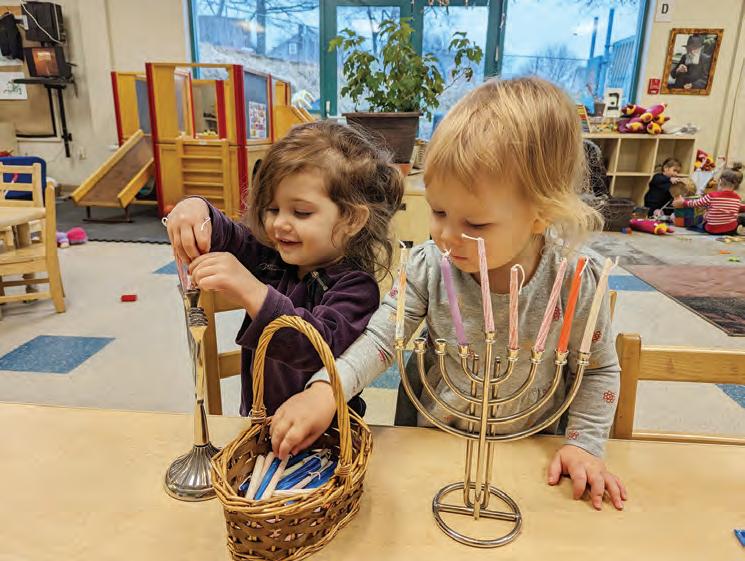
We can do it
A Pittsburgh Party
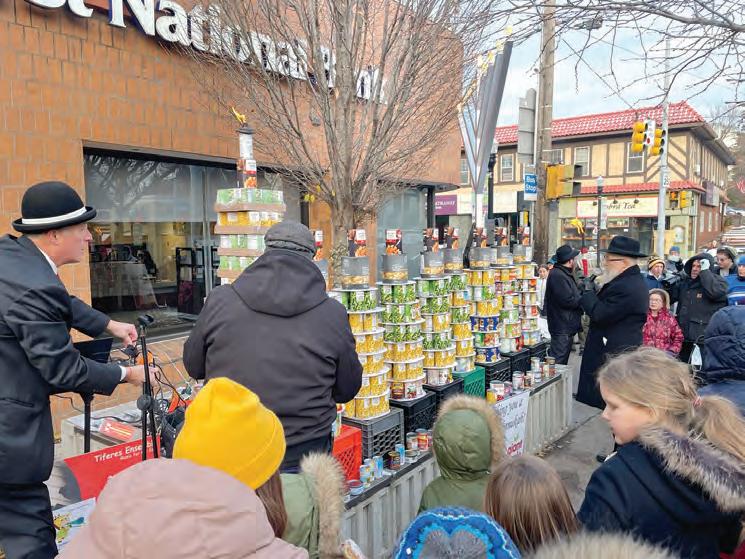

Hooray for Tevet
Spreading joy and light

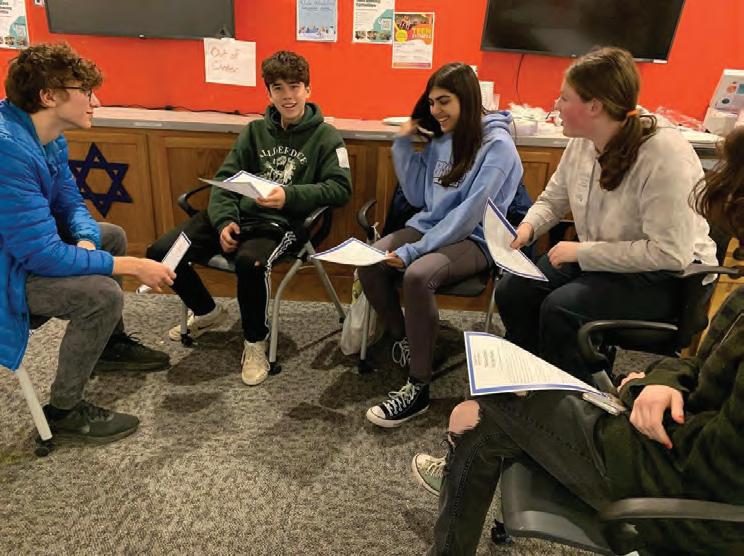
PITTSBURGHJEWISHCHRONICLE.ORG PITTSBURGH JEWISH CHRONICLE DECEMBER 23, 2022 23
Community
p Yeshiva Schools of Pittsburgh Early Learning Center students Ava Rafkin and Batya Minsky explore the joy of Chanukah. Photo courtesy of Yeshiva Schools of Pittsburgh
Diller Pittsburgh celebrated Spread the Light Day by spreading some Chanukah joy at Weinberg Terrace. Teens played bingo and chatted with residents. After the meaningful visit, teens returned to the Jewish Community Center of Greater Pittsburgh for a discussion.
p Teens talk about efforts to repair the world and how best to spread their own light.
Jewish Federation of Greater Pittsburgh Young Adult Division hosted its second annual Chanukah Bash. Participants won prizes, played games and made new friends.
p Julie and Neil Friedman enjoy the fun at the Pittsburgh Opera. Photo by Joshua Franzos
Chabad at Pitt Rosh Chodesh Society hosted a Chanukah party for students to celebrate post-finals.
p Marty Altschul, Sarah Mangan and Sarah Levinthal beautify the neighborhood. Photo courtesy of Chabad at Pitt
p The fun day ended in playing a game of Chanukah Clue and lighting a menorah. Photos courtesy of Jewish Community Center of Greater Pittsburgh
Chabad of Squirrel Hill, in partnership with Our Giving Kitchen and Friendship Circle of Pittsburgh, organized a Chanukah event, which resulted in hundreds of canned food donations to the Squirrel Hill Food Pantry.
p Rabbi Yisroel Rosenfeld lights the Can-orah, a collection of canned goods, at the menorah lighting in Squirrel Hill. Photo courtesy of Our Giving Kitchen

24 DECEMBER 23, 2022 PITTSBURGH JEWISH CHRONICLE PITTSBURGHJEWISHCHRONICLE.ORG Price effective Thursday, December 22 through Wednesday, December 28, 2022 Alle Kosher 80% Lean Fresh Ground Beef •All-natural, corn-fed beef — steaks, roasts, ground beef and more •Variety of deli meats and franks •All-natural poultry — whole chickens, breasts, wings and more Available at select Giant Eagle stores. Visit GiantEagle.com for location information. KOSHER MEATS Available at and 999 lb.










































































 By Jessica Grann | Special to the Chronicle
By Jessica Grann | Special to the Chronicle





































































 By Justin Vellucci | Special to the Chronicle
Cows.
By Justin Vellucci | Special to the Chronicle
Cows.







